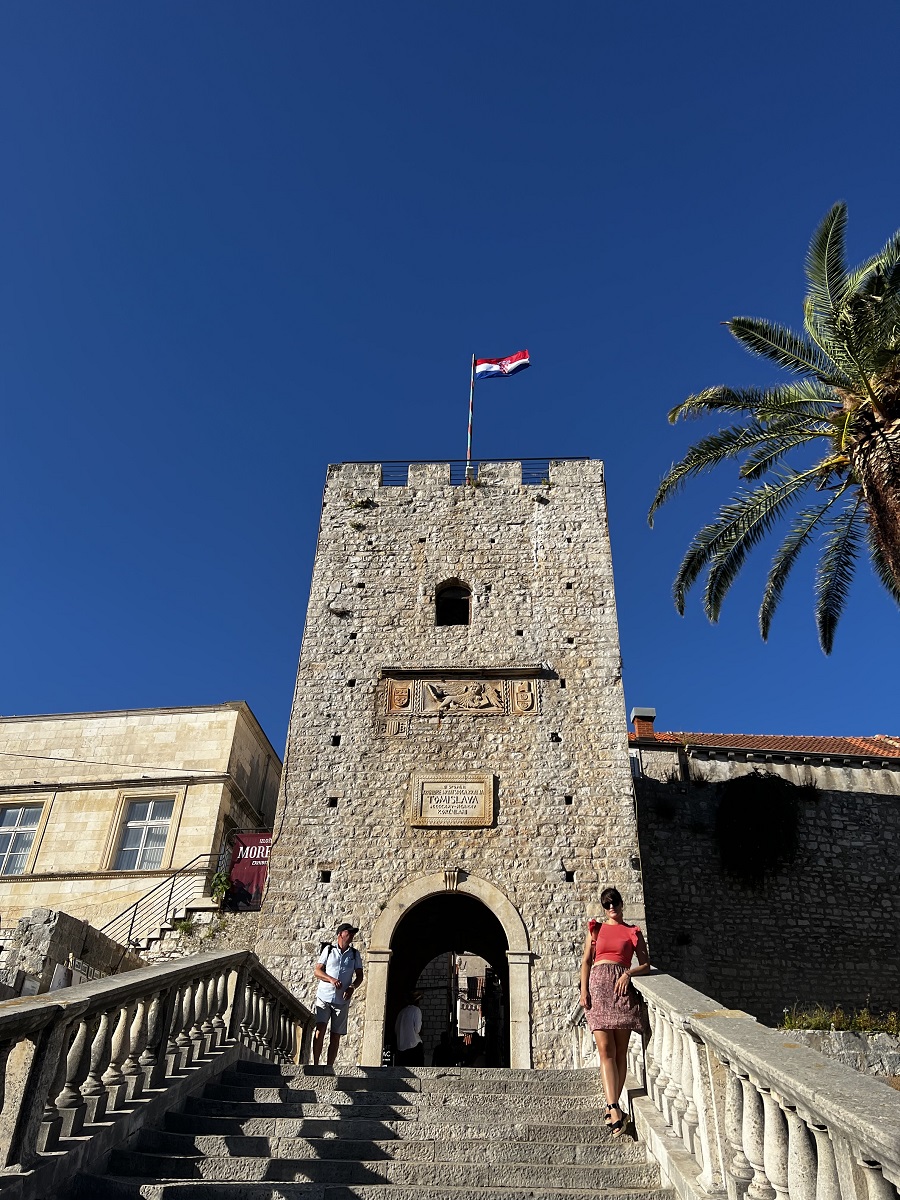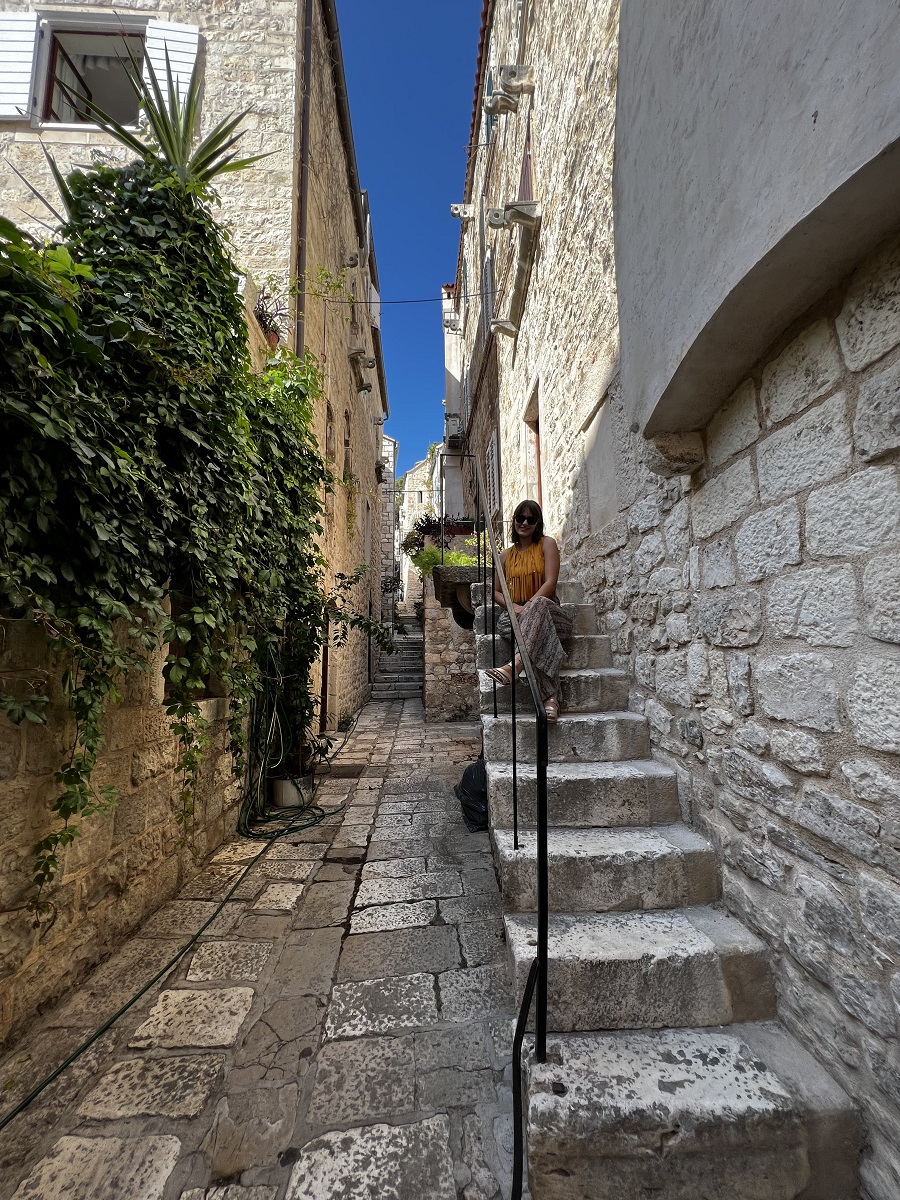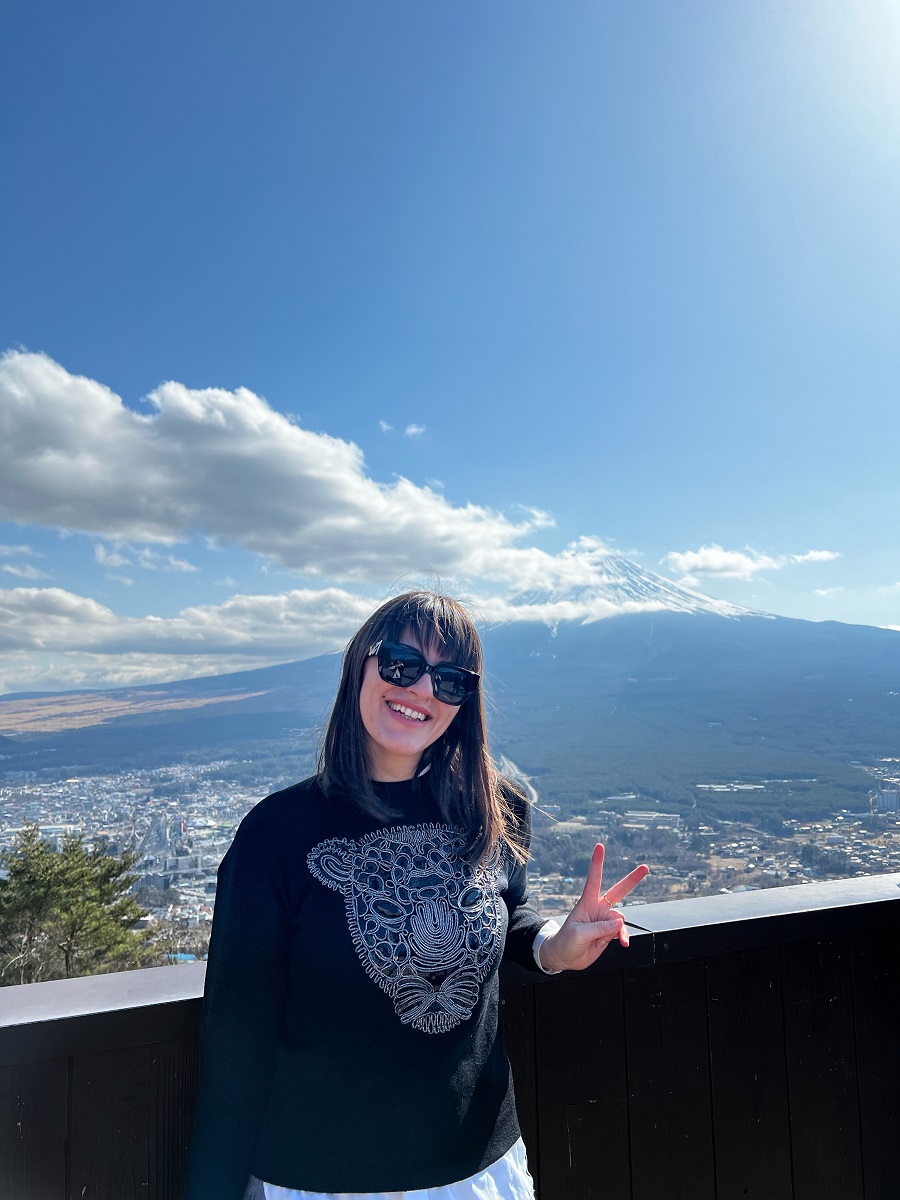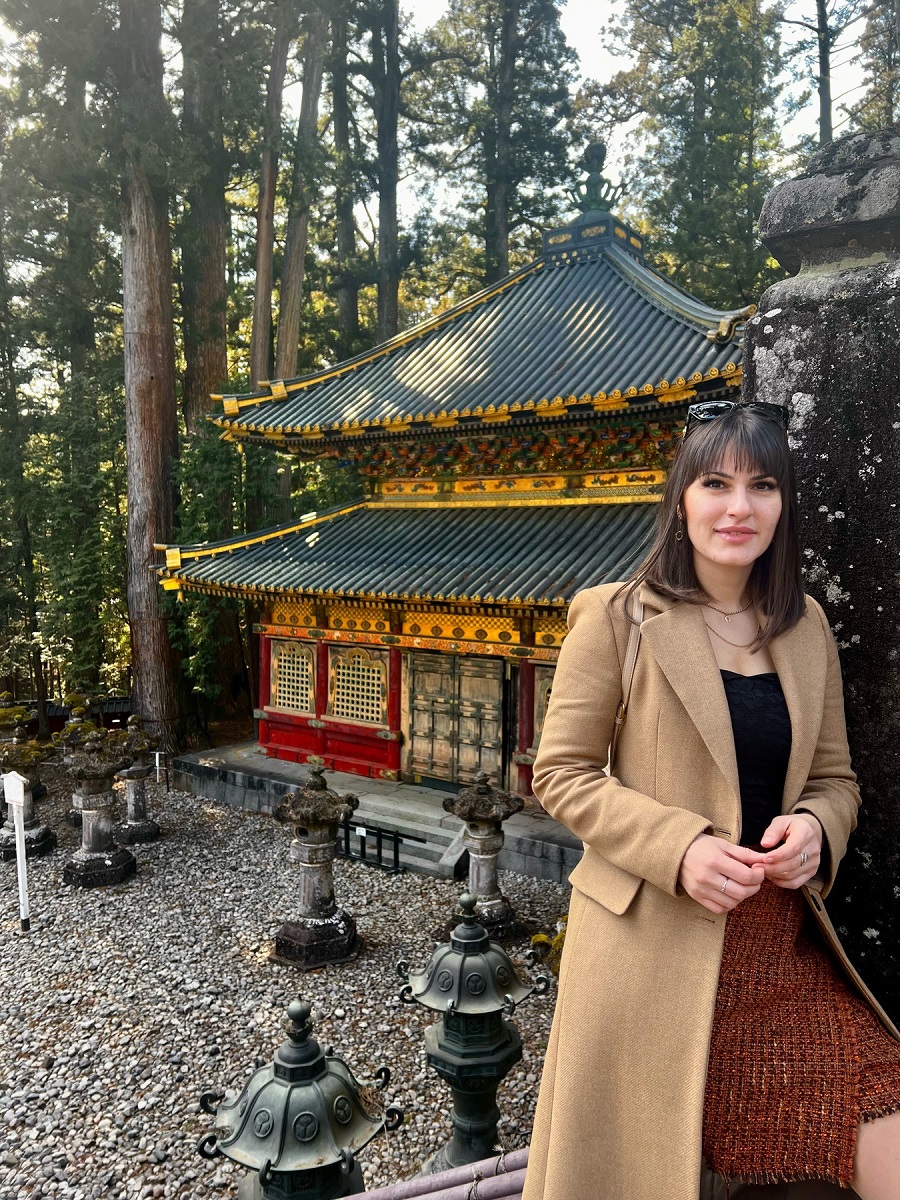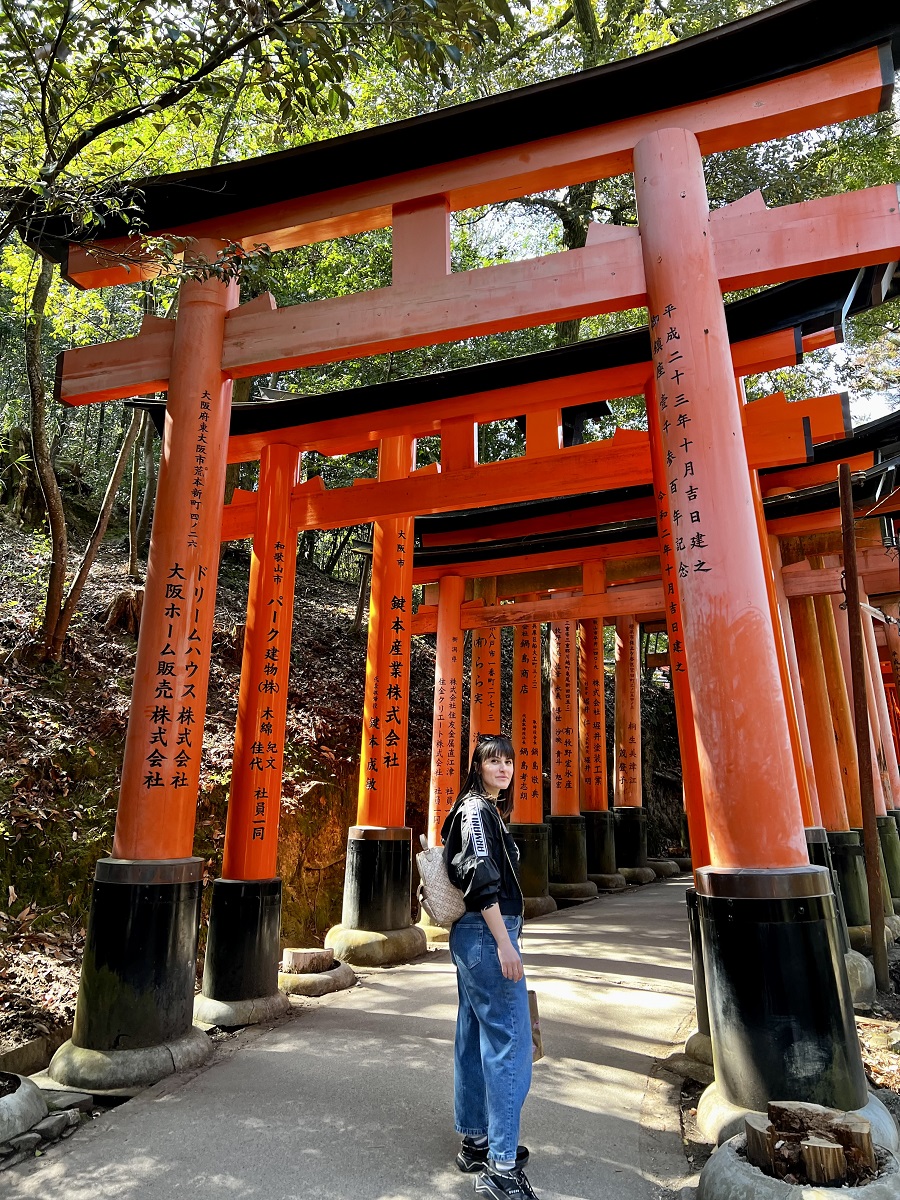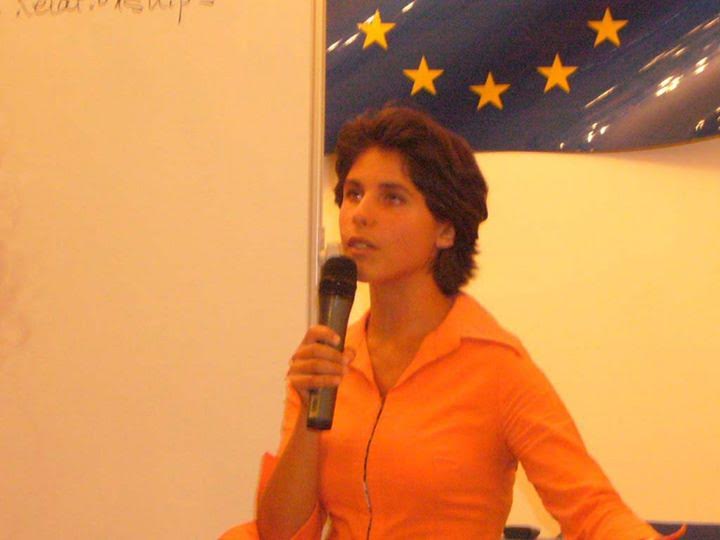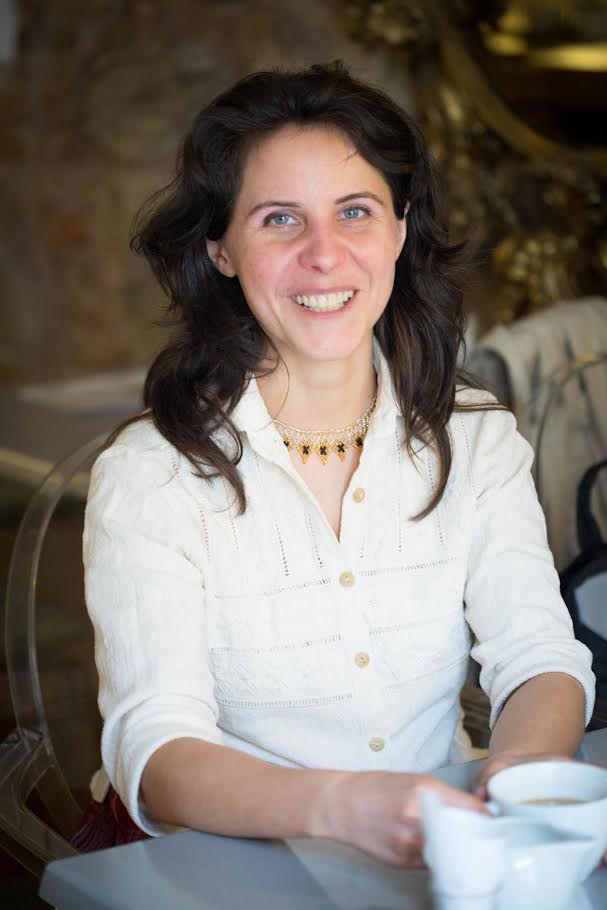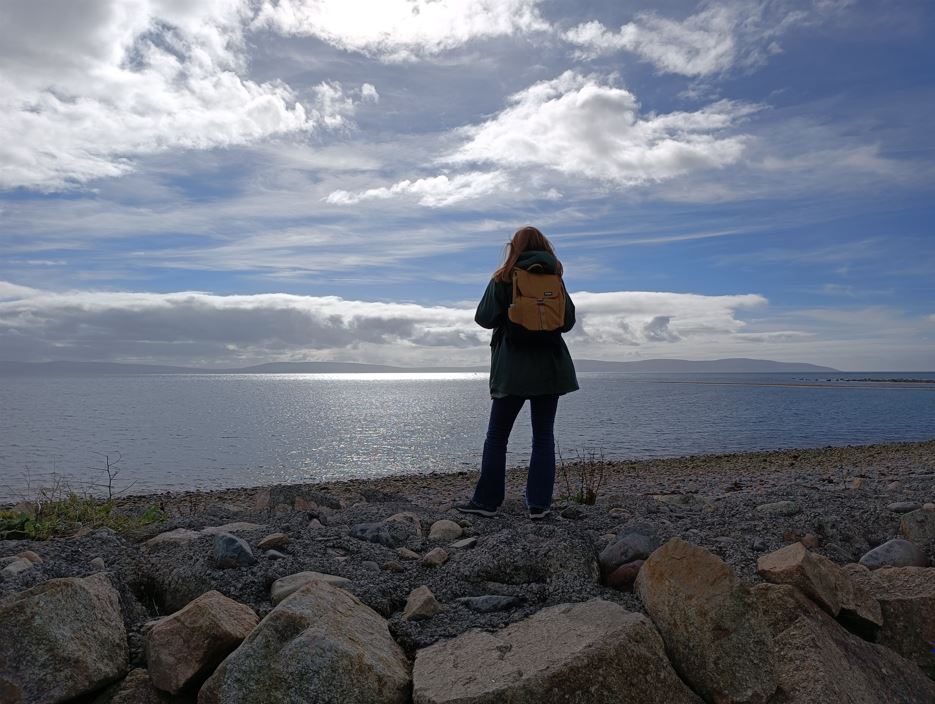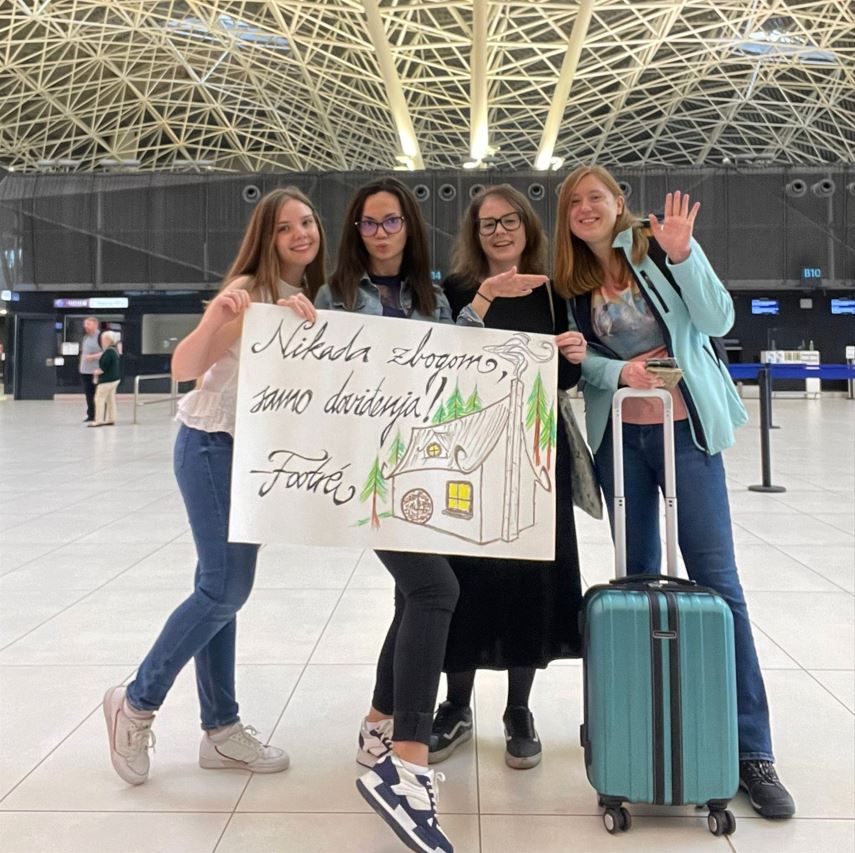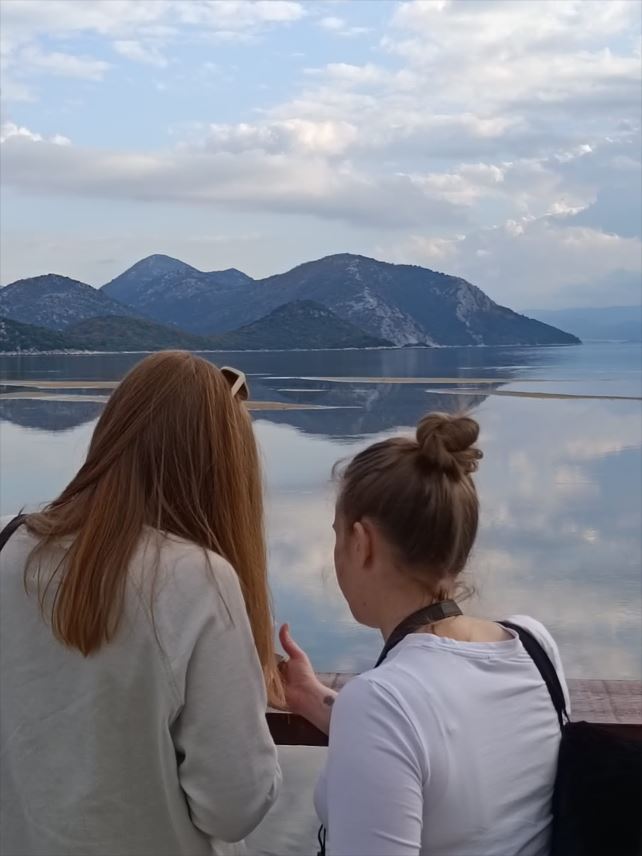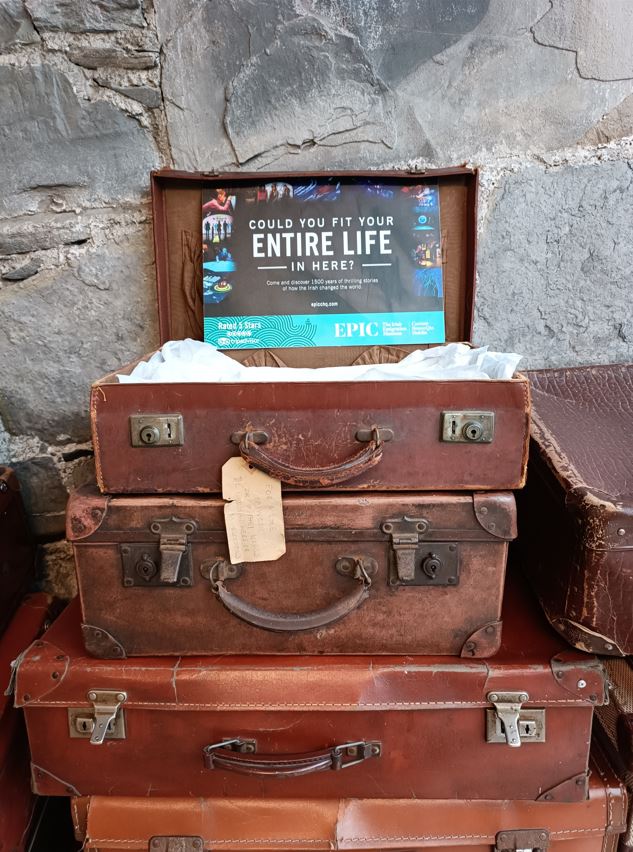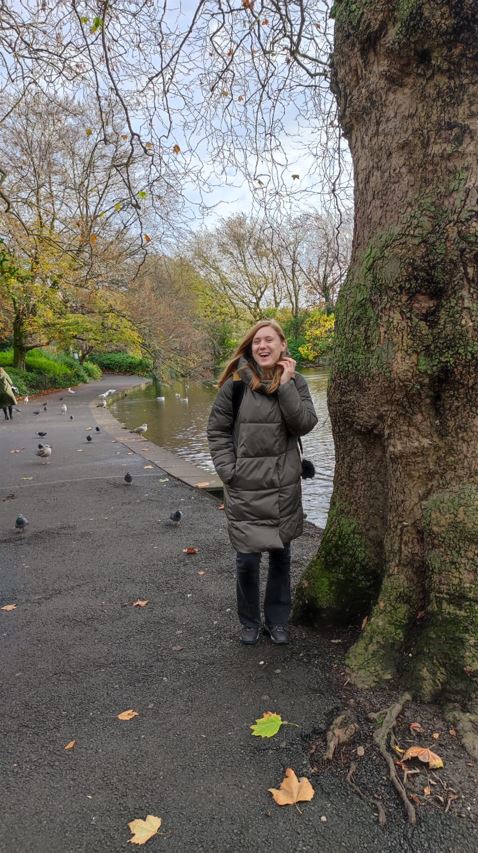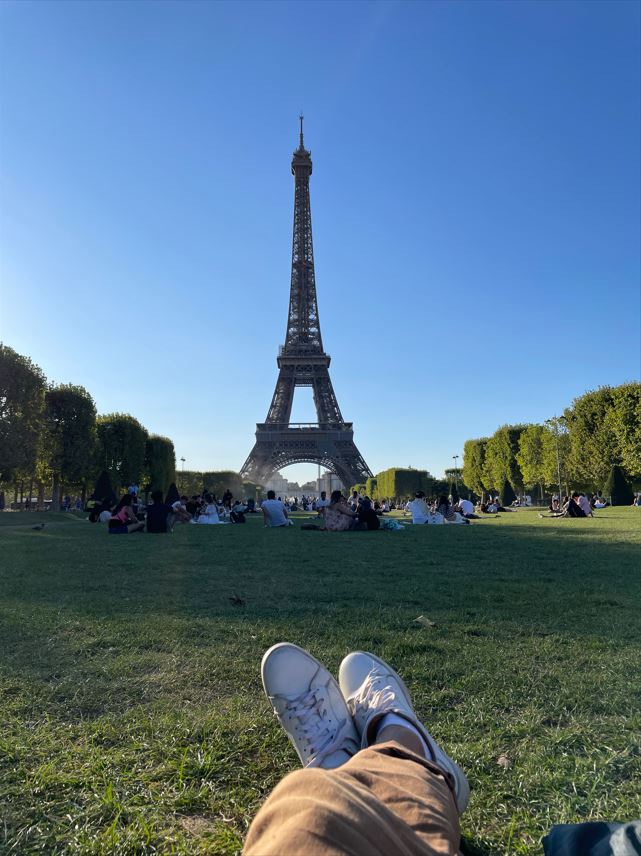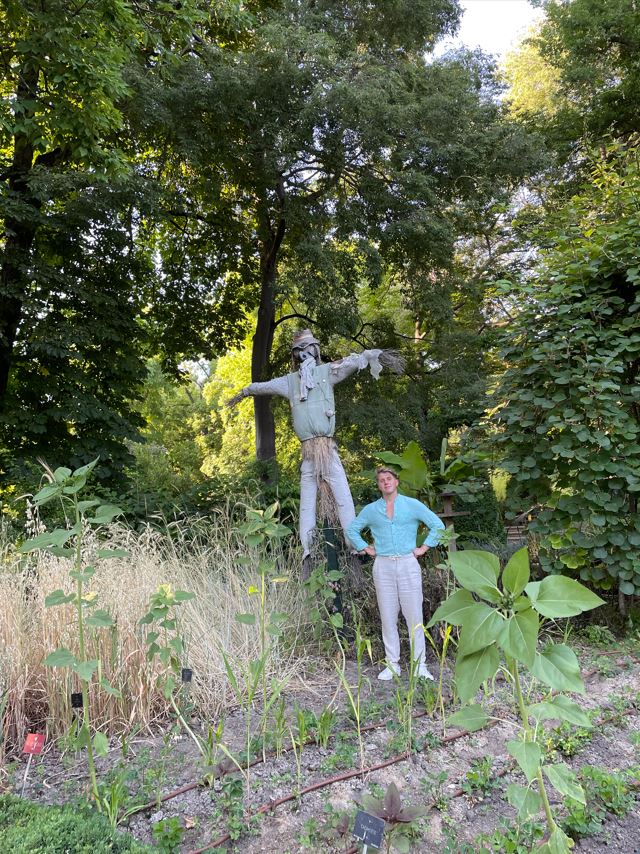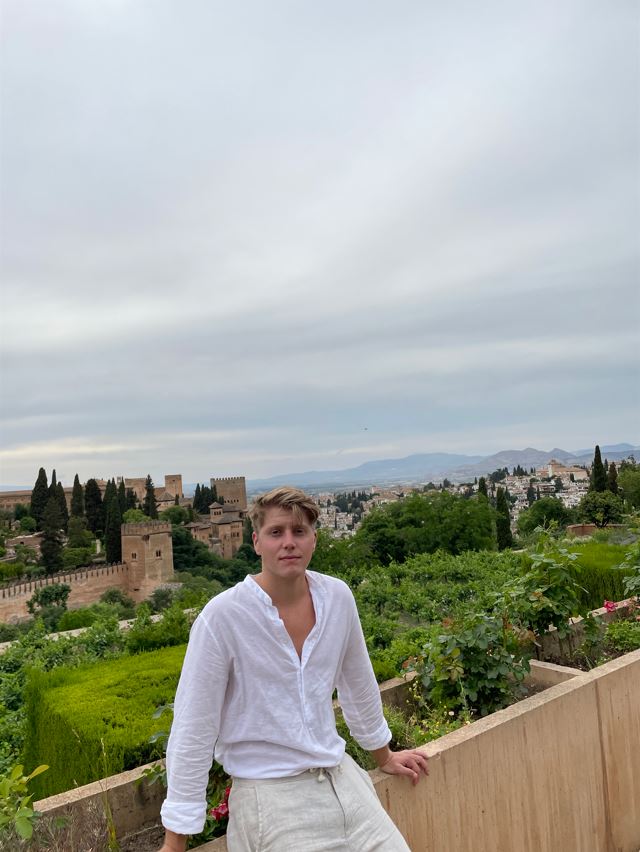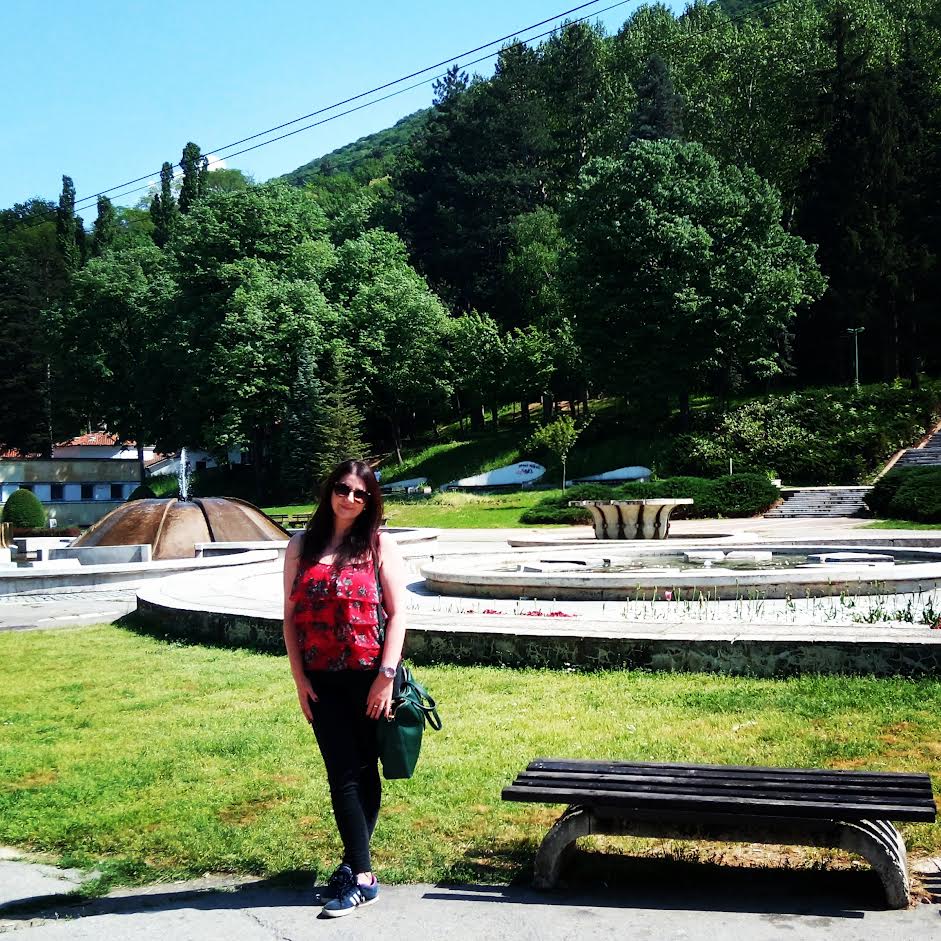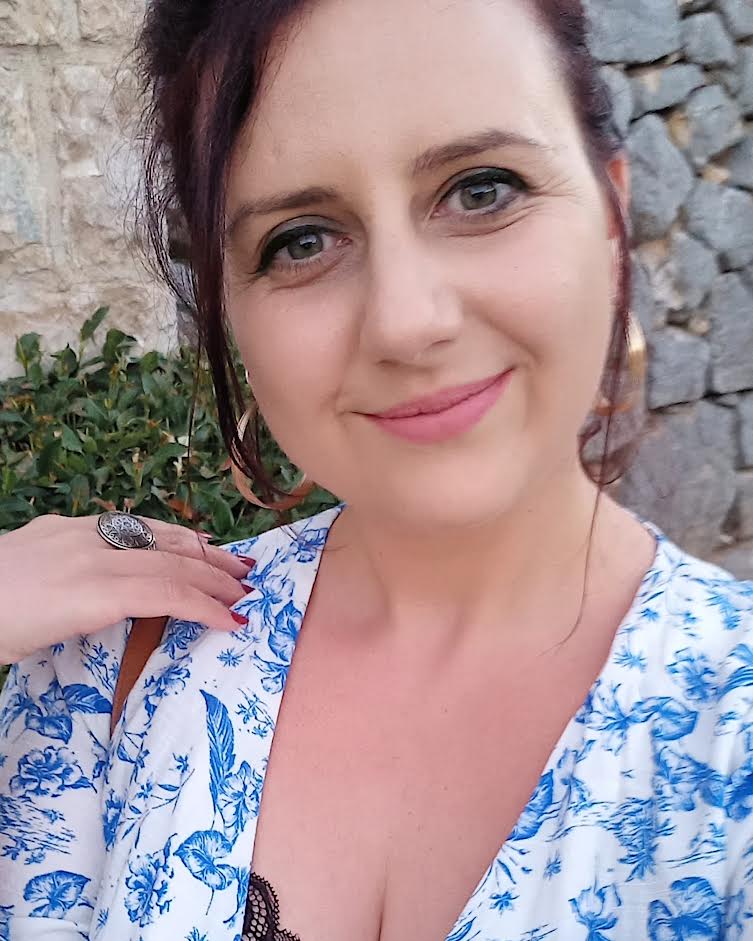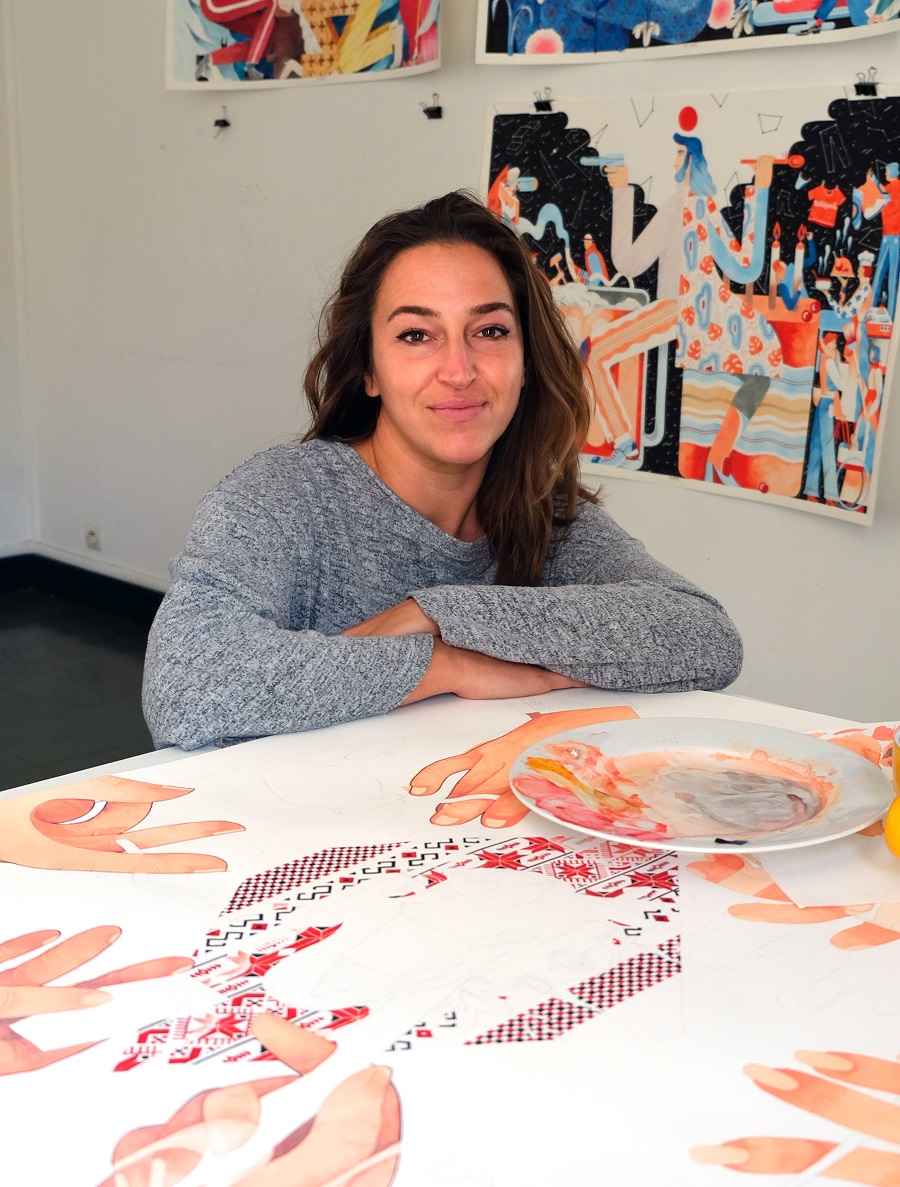Croats Living in Croatia, Earning Abroad: Monika Boshkova in Zagreb
March 29, 2023 - The Croatian dream - to live in Croatia and get income from abroad. Meet the locals who are living that dream, and find out how you could, too, in a new TCN series. In the latest in the series, a guest from North Macedonia, who is enjoying life in Zagreb - meet Monika Boshkova.
Croatia, great for a 2-week holiday, but a nightmare for full-time living unless you are very rich, so the perceived wisdom goes. The Croatian dream is to live in Croatia with a nice income from abroad, as many foreigners and remote workers do. For Croatians, if I read the comments in my recent video, Croatia is the Best Place to Live: 8 Reasons Why (see below), salaries are too low and people are forced to emigrate in search of a better life.
While there is definitely an element of truth to this, it got me thinking. The era of remote work is here, and the workplace is increasingly global, with a labour shortage for many skills. It doesn't matter if you are from Boston or Bangladesh if you have the skills, desire, and work ethic, and are able to work remotely online. And while it is certainly true that salaries in Croatia are low, what about the opportunities that the global online marketplace offers? If foreigners can find ways to live in Paradise and work remotely, why not locals? Curious, I posted this on my Facebook and LinkedIn:
Do I know many Croats who are living in Croatia, but working remotely for international companies who would be interested in being part of a TCN interview series showcasing living in Croatia but earning online, including advice to others on how to get started? It could be an interesting series. If interested, contact me on This email address is being protected from spambots. You need JavaScript enabled to view it. Subject Remote Croatia.
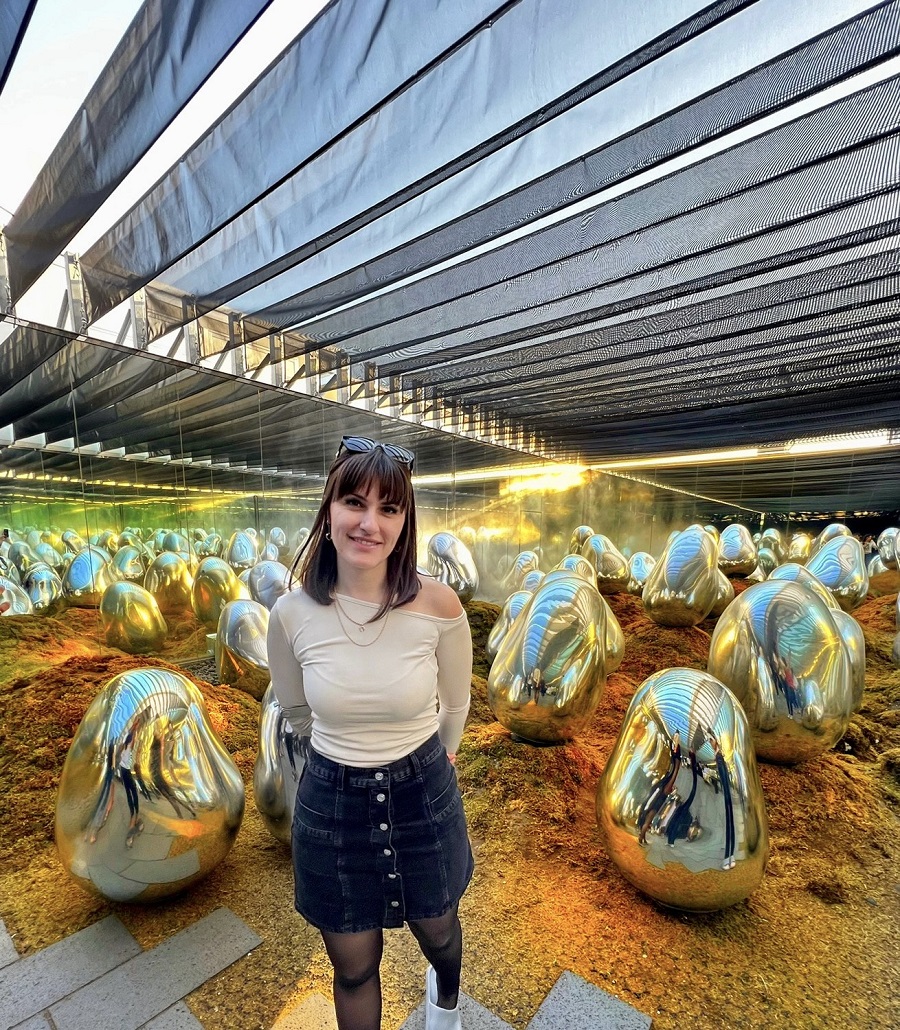
Some 15 emails - and several inspiring stories - later, and I think we have the makings of what could be a rather interesting series, Croats Living in Croatia & Earning Abroad. So far, we have featured all Croatians, but here is a worth addition from North Macedonia now in Zagreb - meet Monika Boshkova.
I’m Monika Boshkova, originally from Macedonia, and I’m grateful to have chosen Croatia as my second homeland. I’ve always had an intense urge to explore the world. I told my parents when I turned 18, they won’t see much of me. Being an only child, especially here in the Balkans, they weren’t exactly thrilled with my decision, but I’m grateful they (mostly) supported my adventures.
While enrolled in Finance and Accounting in Skopje, I signed up for various volunteering projects, work, and different seminars whenever I got a chance worldwide. Until 25, I had visited more than 35 countries because of which I graduated a year later, but hey, it was the best decision that, as I later realized, shaped my entire future.
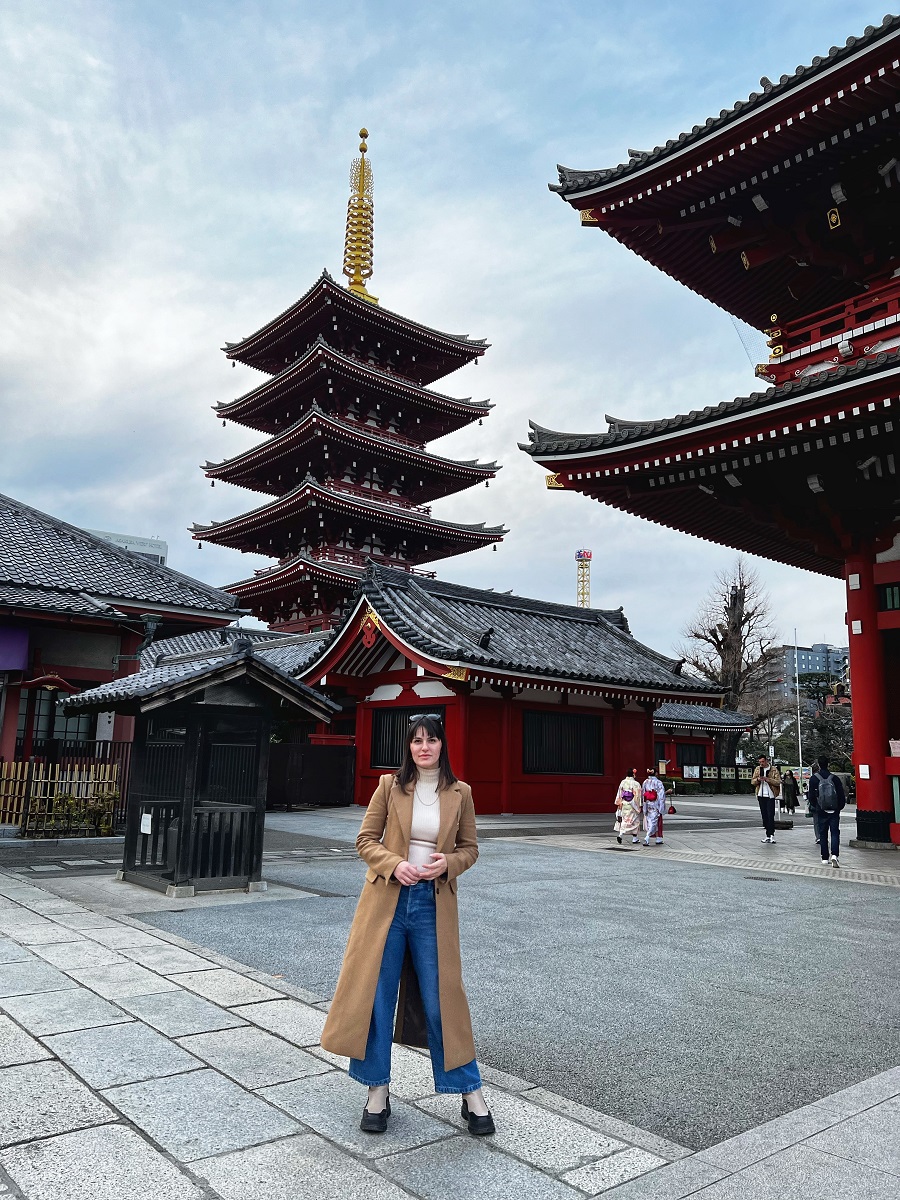
In the meantime, during university, I also started freelancing as a copywriter because all those trips weren’t going to finance themselves. Still, I never saw myself being self-employed at the time.
The decision came later when at 26, I moved to Prague to work in accounting and realized how unhappy I was with the set work and routine. By then, I continued freelancing simply because all the creativity I lacked in my full-time job gave me so much pleasure, and, well, who can say no to the extra income?
So, I finally connected the dots when I left my job in Prague in 2020, and because of my boyfriend, I decided to move to Zagreb. The next logical step was starting my own business, or the infamous obrt as they call it here.
1. Many Croats are emigrating, but you not only chose to stay but managed to achieve the Croatian dream - living here and working for an international company. Tell us how you did it.
Coming from Macedonia, I was already familiar with the Croatian culture, which helped me feel (more or less) at home. Still, just like in Macedonia, I couldn’t see myself thriving here on the set standard and afford the life I had envisioned for myself.
After leaving Prague, I was ready to settle somewhere, and by then, I realized that I loved the freedom that comes with freelancing and all the creativity that I would even work for free. Since then, it was just a matter of a few months of head bumping and arm wrestling with the Croatian bureaucracy to finally start my business venture.
Now, as a freelancer, I work with several clients; some on a long-term contract and some as one-time gigs, which is enough to fill 30–40 hours a week.
Copywriting for new and upcoming businesses, social media maintenance and ads, and organizing website background processes. This is more of a project management style of work with everything from hiring people, writing SOPs for particular workflows, publishing content, creating reports, and anything else that ensures the project goes by plan.
With my type of work, I could have chosen any other country to work from, but I’m happy that love brought me to Croatia. Falling in love with the country soon after was a no-brainer.
2. Looking for jobs based in Croatia can be a challenging task. How challenging was it for you to get where you are today - it must have taken a lot of determination and rejection.
At first, while I was still contemplating whether starting my own business would be too risky here and while still working on gathering all the needed documents to register my business, I tried to find a job.
I looked for something that matched my degree or my copywriting and online marketing skills but was stuck in the middle. Not enough experience in my field of studies but also freelance work was not particularly appreciated by the HRs of all the companies I applied to.
Somehow, starting my own business was inevitable for me. And now, looking back, I’m thankful no one took an interest in my CV.
3. If you can do it, presumably others can too. Are you aware of others who have had similar success but maybe in different industries?
Yes, I meet many people, whether Croats or other digital nomads, that live here while freelancing for international companies. IT is the biggest industry for remote work that pays well.
4. What is the general feeling among people in Croatia today? Is it possible to have a good life here, or is the grass greener on the other side?
For me, the grass was greener wherever I went during my period of traveling and adventures. I think that’s more so a mindset rather than related to an actual country, in this case, Croatia.
5. Apart from corruption and nepotism, low wages are often cited as a reason to emigrate. But the remote work revolution, as your example has shown, as well as the influx of many foreign workers to the likes of Rimac and Infobip, for example, show that a good quality of life IS possible in Croatia. What are your thoughts on that?
Of course. There is so much more to this country that people seem to forget, and I’m grateful that work like yours appears to be reminding them of it. I know income is the most significant factor in determining whether to stay, but if people were as proactive and worked as hard as they did when they went abroad, most would find their happy place under the sun here too.
Another significant “happiness” factor here is not depending on the government or anything connected to it, like the health system.
6. What advice do you have for others who would like to stay in Croatia but have no idea where or how to find a possible remote work job or business as you have managed to do?
Invest in yourself. Take some time to learn new skills, find out what you’re good at, and go for it. I know it sounds cliché, but those who find pleasure in their work consistently outperform those who simply work for the money.
In the first few years of starting my business, I may have made more money if I had stayed in finance and accounting working for someone else, but I would have been deeply unhappy even before I turned 28. That was simply not worth it for me.
There are tons of companies looking for remote workers on LinkedIn to begin with. A “low” salary for them is an excellent starting income for us here. Anyone can start with even the most basic tasks of a VA and then gather enough experience to move forward.
7. Three reasons you decided to stay in Croatia, and the one thing you would like to change in this country.
The warmth of this country, which to me represents the fiery nature of the people, the music, and, oh gosh, the food.
I like the values this country has mostly preserved as opposed to the Western world, so it’s very safe and the place to raise a healthy family.
The plethora of islands and mountains and the contrast between the north and the south regarding places to visit and beauties to see.
One thing I would like to change here is the mindset of most people. The ‘grass is greener’ thing. When you travel and live in several other countries, you see their shortcomings too and realize governments have ups and downs everywhere.
Sure, that’s an understatement for ours here, but changes start from the people, and we must be more appreciative of what we have. And maybe watch the mainstream news a little less; that’ll help unquestionably.
You can follow Monika Boshkova on LinkedIn.
****
Thanks Monika, very inspiring, and congratulations on all your success.
You can follow the rest of this series in the dedicated TCN section here.
If you would like to contribute your story to this series, please contact This email address is being protected from spambots. You need JavaScript enabled to view it. Subject Remote Croatia.
****
What is it like to live in Croatia? An expat for 20 years, you can follow my series, 20 Ways Croatia Changed Me in 20 Years, starting at the beginning - Business and Dalmatia.
Follow Paul Bradbury on LinkedIn.
Subscribe to the Paul Bradbury Croatia & Balkan Expert YouTube channel.
Croatia, a Survival Kit for Foreigners is now available on Amazon in paperback and on Kindle.

Croats Living in Croatia, Earning Abroad: Stjepan Mijat Zaninović, Zastražišće, Hvar
January 17, 2023 - The Croatian dream - to live in Croatia and get income from abroad. Meet the locals who are living that dream, and find out how you could, too, in a new TCN series. In the latest in the series, meet Stjepan Mijat Zaninović, who is enjoying life on Hvar.
Croatia, great for a 2-week holiday, but a nightmare for full-time living unless you are very rich, so the perceived wisdom goes. The Croatian dream is to live in Croatia with a nice income from abroad, as many foreigners and remote workers do. For Croatians, if I read the comments in my recent video, Croatia is the Best Place to Live: 8 Reasons Why (see below), salaries are too low and people are forced to emigrate in search of a better life.
While there is definitely an element of truth to this, it got me thinking. The era of remote work is here, and the workplace is increasingly global, with a labour shortage for many skills. It doesn't matter if you are from Boston or Bangladesh if you have the skills, desire, and work ethic, and are able to work remotely online. And while it is certainly true that salaries in Croatia are low, what about the opportunities that the global online marketplace offers? If foreigners can find ways to live in Paradise and work remotely, why not locals? Curious, I posted this on my Facebook and LinkedIn:
Do I know many Croats who are living in Croatia, but working remotely for international companies who would be interested in being part of a TCN interview series showcasing living in Croatia but earning online, including advice to others on how to get started? It could be an interesting series. If interested, contact me on This email address is being protected from spambots. You need JavaScript enabled to view it. Subject Remote Croatia.
Some 15 emails - and several inspiring stories - later, and I think we have the makings of what could be a rather interesting series, Croats Living in Croatia & Earning Abroad. Next up in the series, Stjepan Mijat Zaninović, from the village of Zastražišće on Hvar.
My name is Stjepan Mijat Zaninović. I’m from Zastražišće, a small village on Hvar island.
And if you aren’t from Croatia, the line above probably made you feel something like this.
But from this point, there won’t be many č,ć,ž,š, and other elvish letters. I hope my story helps you realize what it takes to make it in Croatia. And by the end of the story, you’ll see why donkeys are sacred animals in Dalmatia.
You managed to achieve the Croatian dream - living here and working for international companies. Tell us how you did it.
The short answer is that I had no other choice. But that’s not how interviews work, so I have to take you back to 2017.
I was a night receptionist in a 4* hotel in Split and karate sensei.
After finishing high school and dropping out of college, I was destined to spend my life in positions no one else wanted. I was ok with that. But with a job no one wants comes the boss no one wants. And I’m not the type of person who sits and complains. I complain a lot, but I can’t sit still. So instead of crying over my destiny to work for the minimum wage, I decided to cash in on the only other skill I had. Something I call connectivity, but for the sake of avoiding elvish, let’s call it writing for now.
Nights in a hotel were long, so I decided to write a book to honor my path, mission, and the lady who made that path brighter. The one who made my mission clear. That’s how “The Girl With the Fire in Her Hair” was born.
But this is Croatia, and I’m no one, so no one wanted to publish my book.
So I started looking for ways to make money through writing, which led me to Freelancer.com. A platform where cheap people go to find affordable talents to take care of gigs no one else wants. But I was happy with every project I could get because I was finally getting paid to write. I worked a week for a dollar, but I made money online doing something I liked.
Soon after, I started writing landing pages for natural supplements and taking care of social media for one American holistic brand. I was underpaid, but I was happy.
Today, 500+ landing pages and 3,000,000 words of blogs later, I’m still underpaid and happy. I’m also self-employed and working almost exclusively with foreign companies. I just wrapped up a long-form sales letter for a tantric retreat in Costa Rica. Next week, I'll start doing cold email outreach for a growth agency with an office in Chicago. But I’m an introvert like many copywriters. Blowing my own horn isn’t really my thing, so let’s move to the next question.
Looking for jobs based in Croatia can be a challenging task. How challenging was it for you to get where you are today - it must have taken a lot of determination and rejection.
It was the ultimate test of willpower, partially because I was ignorant (and poor as a mouse). It took me 2 years to realize that I wasn't a writer but a copywriter. And I couldn’t afford any mentors, so I had to do everything the hard way. I was bidding for numerous jobs left and right. I won some but lost many more. Every time a prospect would ghost me felt like a head kick. I hate getting rejected. I wanted to give up many times. Until October 2021, I was working full-time and writing full-time. Working 2 jobs drains a person.
But remember, I’m a stubborn Dalmatian donkey.
So now I’m a proud owner of a marketing agency Ihneumon Connectivity. Now, I cooperate closely with 6,7, and 8-figure companies. I even sometimes help other copywriters get to the next level.
3. If you can do it, presumably others can too. Are you aware of others who have had similar success, but maybe in different industries?
If I can do it, anyone can.
I’m focused on foreign markets, so I’m not networking with Croats that much (and being 100% introverted doesn’t help). However, I heard about many people from Croatia who “made it” without leaving Croatia.
So yeah, it’s possible. Difficult, but possible. Even though someone with enough money to pay for mentors and enough friends to help them can climb much faster than I have. Being one of the stars of the mentorship program by Stefan Georgi and Justin Goff (huge names in direct response copywriting) changed my life. That and the fact that I was too stupid to give up brought me where I am today.
4. What is the general feeling among people in Croatia today? Is it possible to have a good life here, or is the grass greener on the other side?
I won’t go all political here, but I have to say that one of the first articles I’ve ever written was “Croatia - the Rotten Diamond.” Croatia is the best place in the universe in many ways, but it’s terrible at the same time.
I’d say that the general feeling today is that honest work almost isn’t enough to survive in Croatia while being an Uhljeb (let’s say a parasite) is the Croatian Dream. The problem is that some people in Croatia live great, relaxed lives while most struggle to make ends meet. That creates gaps between people and divides us. But in the end, I guess that’s all part of the bigger plan. Divide and conquer is one of the most powerful techniques in every aspect of life. Yet, let’s jump to the next question before I get myself in trouble by revealing painful truths about Croatia.
5. Apart from corruption and nepotism, low wages are often cited as a reason to emigrate. But with the remote work revolution, as your example has shown, as well as the influx of many foreign workers to the likes of Rimac and Infobip for example, show that a good quality of life IS possible in Croatia. What are your thoughts on that?
I agree. Good quality of life is possible in Croatia. But even when you work remotely, you’re still in this rotten diamond. That means you still need to deal with prices that fit Scandinavian countries more than Balkan. That means you still have to deal with injustice on every corner. And I’m not worried about myself. I’ll deal with it. Other young people will deal with it (or leave the country).
I’m worried for my mom and dad. I’m worried for people who must work until they drop dead because we need to feed all the parasites. I hate to imagine the future in the country that has repaired 6 (in letters - SIX) houses since the earthquake 2 years ago.
*deep breath*
Let’s move on. There’s no need to ruin this beautiful day.
6. What advice do you have for others who would like to stay in Croatia, but have no idea where or how to find a possible remote work job or business as you have managed to do?
I could write a book of tips on that topic, but I don’t want to waste everyone’s time, so here are some bullets.
- Network - Take this from the demigod of introverts; you can’t make it alone. It’s simply impossible.
- Keep honing your skills - But it’s impossible to make it if you suck at what you do.
- Keep learning new skills - And if you decide that there’s nothing new to learn, you won’t stay on top for long. Last month I learned how to use ClickFunnels. In the past 6 months, I worked in 7 new niches. You must be hungry all the time. If there's more to be done, you've done nothing yet.
- Become a donkey - this one is the most important. Without this one, everything else is futile. Donkeys are noble animals, but they’re stubborn as hell. You must be so determined that nothing can stop you. And I know that’s true everywhere, not just in Croatia.
7. Three reasons you decided to stay in Croatia, and the one thing you would like to change in this country.
I’ll start with things I’d love to change because I want to finish this in a happy tone. I’d change the fact that Croatia has 555 local government units while the UK has 333. Can you imagine the number of parasites we need to feed?
I’d change the fact that the entire country depends on the weather. And not in a good way. I’d love to see more windmills, solar panels, and stuff. But sadly, we depend on the weather in a silly way. If the weather during Summer isn't perfect (or there’s some virus in the air), there’s no tourism. If there’s no tourism, well…
Croatia earns most of its money from tourism. More than any other country in the EU. Tourism brought a staggering 21% of the Croatian GDP in 2019. I heard 2022 was even better, so I don’t want to imagine what would happen if tourists decide to avoid this Rotten Diamond.
Now, let’s move to the reasons why I decided to stay:
- My mom would cry forever. My brother is in Ireland. Losing 2 of her kids would probably kill her.
- My wife wanted to go to Ireland. I wanted to go to Japan. The weather in Ireland sucks, and Japan is too expensive. For now, Stari Grad is home.
- I feel deeply connected to Hvar. My soul belongs here.
I appreciate this chance to share my story, Paul.
You can connect with Stjepan on LinkedIn and on Facebook.
****
Thanks Stjepan, very inspiring, and congratulations on all your success.
You can follow the rest of this series in the dedicated TCN section here.
If you would like to contribute your story to this series, please contact This email address is being protected from spambots. You need JavaScript enabled to view it. Subject Remote Croatia.
****
What is it like to live in Croatia? An expat for 20 years, you can follow my series, 20 Ways Croatia Changed Me in 20 Years, starting at the beginning - Business and Dalmatia.
Follow Paul Bradbury on LinkedIn.
Subscribe to the Paul Bradbury Croatia & Balkan Expert YouTube channel.
Croatia, a Survival Kit for Foreigners is now available on Amazon in paperback and on Kindle.

Croats Living in Croatia, Earning Abroad: Kosjenka Muk near Karlovac
January 12, 2023 - The Croatian dream - to live in Croatia and get income from abroad. Meet the locals who are living that dream, and find out how you could, too, in a new TCN series. In the latest in the series, meet Kosjenka Muk, who is enjoying life in Istria.
Croatia, great for a 2-week holiday, but a nightmare for full-time living unless you are very rich, so the perceived wisdom goes. The Croatian dream is to live in Croatia with a nice income from abroad, as many foreigners and remote workers do. For Croatians, if I read the comments in my recent video, Croatia is the Best Place to Live: 8 Reasons Why (see below), salaries are too low and people are forced to emigrate in search of a better life.
While there is definitely an element of truth to this, it got me thinking. The era of remote work is here, and the workplace is increasingly global, with a labour shortage for many skills. It doesn't matter if you are from Boston or Bangladesh if you have the skills, desire, and work ethic, and are able to work remotely online. And while it is certainly true that salaries in Croatia are low, what about the opportunities that the global online marketplace offers? If foreigners can find ways to live in Paradise and work remotely, why not locals? Curious, I posted this on my Facebook and LinkedIn:
Do I know many Croats who are living in Croatia, but working remotely for international companies who would be interested in being part of a TCN interview series showcasing living in Croatia but earning online, including advice to others on how to get started? It could be an interesting series. If interested, contact me on This email address is being protected from spambots. You need JavaScript enabled to view it. Subject Remote Croatia.
Some 15 emails - and several inspiring stories - later, and I think we have the makings of what could be a rather interesting series, Croats Living in Croatia & Earning Abroad. Next up in the series, Kosjenka Muk near Karlovac.
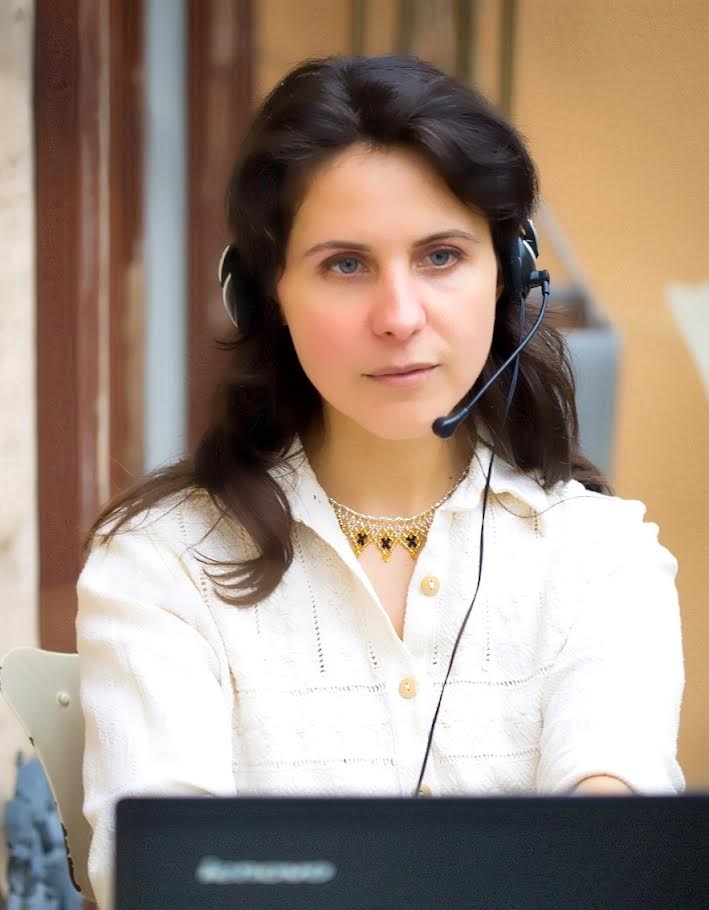
My name is Kosjenka Muk, and I work as a coach for emotional and relationship issues. I grew up in central Istria and now live close to Karlovac, working mostly online while enjoying gardening and traveling in my free time.
My passion for psychology started around the age of 15 when I found some books about positive thinking and self-esteem in my local library. From my adult perspective, those books now seem oversimplified and superficial, but at that time, they gave me a breakthrough change of perspective. They helped me turn my adolescent depression around and made me realize that many of my uncomfortable emotions and beliefs were not the reality – and could change. I remember thinking, "How is it possible that nobody around me knows anything about this? How much would the world change if more people knew about this!” Of course, I was way too idealistic and inexperienced at the time, but from then on, my path in life was clear to me.

I decided to study what was then called "social pedagogy” rather than psychology, after being told that the study of psychology in Croatia is much more theoretical than practical. But where I truly found myself was in an extracurricular method of coaching called Integrative Systemic Coaching.
After some years of practice in Croatia only, I slowly moved on to online work in both Croatian and English. Now my clients are partly from Croatia, and partly from all over the world. Online work enables me not only to reach more people, but to live in the countryside rather than in a city, which I prefer as a nature lover and a bit of a farmer at heart. The Internet made it possible for me to achieve most of my dreams, and I keep thinking how lucky I am to live at this time in history, even with all its problems.
1. Many Croats are emigrating but you not only chose to stay, but managed to achieve the Croatian dream - living here and working for an international company. Tell us how you did it.
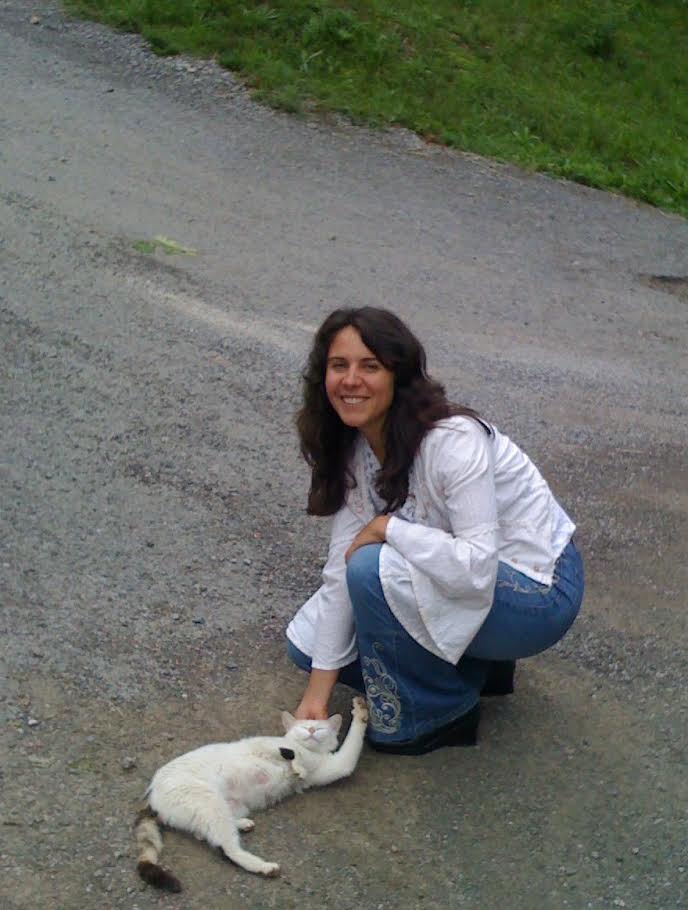
I'm actually self-employed rather than working for a company. It was quite a rough ride at first. I started in 2004, when the Internet was still relatively young in Croatia (but developing quickly), not many people even had an e-mail address yet, there was no tradition of coaching or voluntarily going to therapy, the market was small but the competition already fairly strong.
The first 2 years were bare survival. I tried various ways to promote my work, some rather expensive but none successful. I had no money to pay for web design, so I learned basic HTML to create a simple website myself. Then I started writing articles, which at first I sent to my friends' emails. Many people forwarded my articles around, which prompted new people to ask for them, and so my mailing list and practice grew. I also started giving regular public talks, often in libraries.
I'm a rather shy introvert, so all of that was quite scary for me, but my drive was stronger. Not to mention that I should live what I preach, right? After a while, I got an offer from a small publishing company to publish my articles as a book, which I eventually decided to publish myself. I also got an offer from a friend to make some CDs with guided exercises, which we did, but they didn't sell well.
Things were going well for a few years, and then the 2008 recession struck. Within a few months, I lost 80% of my income. Survival mode again! Luckily, my (now late) first partner, who was also my business partner at the time, was there to help. Together, we decided to include online coaching into our work. That was also tough at first, but slowly grew. I published my second book and decided to translate the first one into English and put it on Amazon. While researching Amazon publishing, I noticed that many people prefer short books they can read quickly, so I also wrote and published several short "workbooks”. Those don't bring much income, but are a source of credibility. I even recently met my new partner through them, so they obviously weren't a waste of time.
2. Looking for jobs based in Croatia can be a challenging task. How challenging was it for you to get where you are today - it must have taken a lot of determination and rejection.
My only experience of working for someone else was 2 years of part time work in a social service project in Istria, which was a part of the then government program called "S faksa na posao” ("From study to work”), which was meant to give graduate students some work experience so they would be more employable. After that, I got an offer for a full-time job in a local school, but I also wanted to start my own practice, which was a tough decision, especially for my parents' peace of mind. But I knew what I wanted, and I never looked back. The rest is history which you already know.
3. If you can do it, presumably others can too. Are you aware of others who have had similar success, but maybe in different industries?
I know of a few people in my own "trade”, as well as of quite a few IT experts, a couple of translators, a graphic designer, and a woman who promotes Croatian tourism and has published several successful books of Croatian recipes. The more the Internet and related industries grow, and especially with the recent jump in popularity of home office and online work, creative and persistent people have more opportunities than ever before.
4. What is the general feeling among people in Croatia today. Is it possible to have a good life here, or is the grass greener on the other side?
We all know the grass is always greener on the other side. But of course it's often more a matter of perception than reality. For some people, it might be easier to succeed in the West rather than Croatia, but it's also much easier to succeed from Croatia than from many other places in the world, especially nowadays. Living in rich countries also has its downsides, as foreigners who choose to live in Croatia well know.
My impression is that young people are moving further and further away from the socialist mindset of relying on somebody else for employment, although the older generations still often have discouraging views on entrepreneurship. Many people have moved out, many people (rightfully) complain, but I hope as time goes by, Croatia will be an increasingly attractive place to live.
5. Apart from corruption and nepotism, low wages are often cited as a reason to emigrate. But with the remote work revolution, as your example has shown, as well as the influx of many foreign workers to the likes of Rimac and Infobip for example, show that a good quality of life IS possible in Croatia. What are your thoughts on that?
Personally, I never had any particular "connections” to pull, nor did I ever consider finding some or bribing anybody, although I'm well aware that many local people get through life that way and sometimes don't seem to have a choice. There are some objective obstacles and difficulties to succeeding in Croatia, slow bureaucracy and high taxes, for example, on top of what you already mentioned. Still I would say that the biggest obstacles are in one's head. I hope with time more and more Croatian people will learn to think in terms of "Why not?” and to see difficulties as challenges, rather than the reasons to not try. Modern times give us so many opportunities. And hopefully we can collectively smarten up and start working on removing the obstacles, as well.
I must add I'm glad I'm only responsible for my own salary, though. Having employees would be much more difficult.
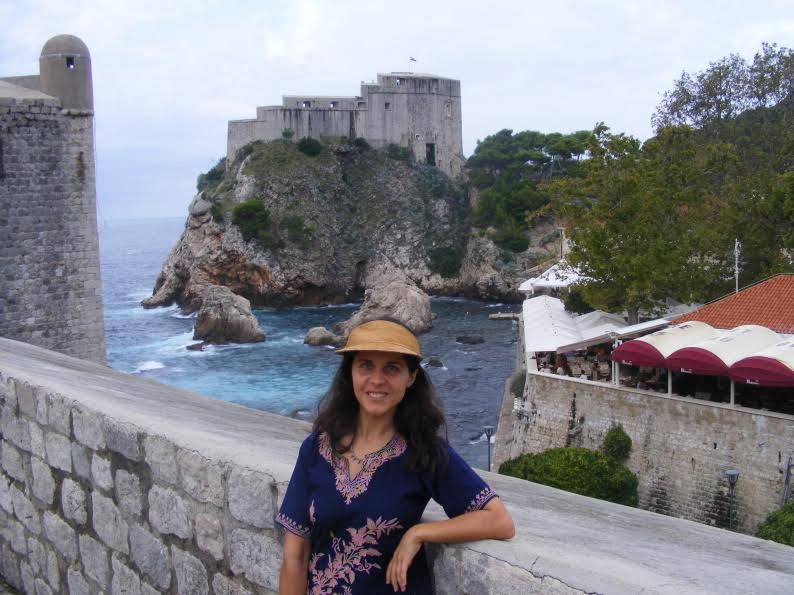
6. What advice do you have for others who would like to stay in Croatia, but have no idea where or how to find a possible remote work job or business as you have managed to do?
Your head is where you start. Be willing to take (reasonable) risks and get out of your comfort zone. Be willing to learn, including learning things beyond your primary area of interest. Expect some struggle in the early years and be patient, don't expect too much too soon. Develop your creativity and brainstorm ideas. More important than anything, think of mistakes and failures as the fastest way to learn, rather than proof you can't make it.
7. Three reasons you decided to stay in Croatia, and the one thing you would like to change in this country.
1) Balance. The work-life balance, the balance between industry and nature, even between rules and freedom (although the latter sometimes brings some headaches). I like that Croatia is not overpopulated, and most people still don't measure others by how much they earn, even if the introduction of wild capitalism in the 90s made things worse in this context.
2) Nature. I took Croatia for granted when I was a kid, and preferred long-distance travel at first, but the more experience I have, the more I realize how much beauty we have in a relatively small area.
3) Prices of real estate, especially of land if you want a garden, especially if you don't feel you must live at the coast or in Zagreb.
4) (optional) To not feel treated like an immigrant and a second-grade citizen, although as a taxpayer in Croatia, I have certain doubts about evading the latter.
What I would most like to change is the attitude to voting in Croatia. Not only to coming out to vote at all, but also voting along party lines, tribal lines, inertia lines, or even corruption lines. Only when we change that, can we truly start solving the other problems.
Contacts:
You can learn more about Kosjenka Muk via her website and Facebook.
****
Thanks Kosjenka, very inspiring, and congratulations on all your success.
You can follow the rest of this series in the dedicated TCN section here.
If you would like to contribute your story to this series, please contact This email address is being protected from spambots. You need JavaScript enabled to view it. Subject Remote Croatia.
****
What is it like to live in Croatia? An expat for 20 years, you can follow my series, 20 Ways Croatia Changed Me in 20 Years, starting at the beginning - Business and Dalmatia.
Follow Paul Bradbury on LinkedIn.
Subscribe to the Paul Bradbury Croatia & Balkan Expert YouTube channel.
Croatia, a Survival Kit for Foreigners is now available on Amazon in paperback and on Kindle.

Croats Living in Croatia, Earning Abroad: Barbara Boltiš in Ivanić Grad
January 5, 2023 - The Croatian dream - to live in Croatia and get income from abroad. Meet the locals who are living that dream, and find out how you could, too, in a new TCN series. In the latest in the series, meet Barbara Boltiš, who is enjoying life in Ivanić Grad.
Croatia, great for a 2-week holiday, but a nightmare for full-time living unless you are very rich, so the perceived wisdom goes. The Croatian dream is to live in Croatia with a nice income from abroad, as many foreigners and remote workers do. For Croatians, if I read the comments in my recent video, Croatia is the Best Place to Live: 8 Reasons Why (see below), salaries are too low and people are forced to emigrate in search of a better life.
While there is definitely an element of truth to this, it got me thinking. The era of remote work is here, and the workplace is increasingly global, with a labour shortage for many skills. It doesn't matter if you are from Boston or Bangladesh if you have the skills, desire, and work ethic, and are able to work remotely online. And while it is certainly true that salaries in Croatia are low, what about the opportunities that the global online marketplace offers? If foreigners can find ways to live in Paradise and work remotely, why not locals? Curious, I posted this on my Facebook and LinkedIn:
Do I know many Croats who are living in Croatia, but working remotely for international companies who would be interested in being part of a TCN interview series showcasing living in Croatia but earning online, including advice to others on how to get started? It could be an interesting series. If interested, contact me on This email address is being protected from spambots. You need JavaScript enabled to view it. Subject Remote Croatia.
Some 15 emails - and several inspiring stories - later, and I think we have the makings of what could be a rather interesting series, Croats Living in Croatia & Earning Abroad. Next up in the series, Barbara Boltiš in Ivanić Grad.
I’m Barbara, and if you are not from Croatia or a neighbouring country, it will be a challenge to pronounce my surname, but you can give it a try – it’s Boltiš. I grew up and I live in the small town of Ivanić-Grad near the capital of Croatia. After finishing high school in my hometown, I studied communication science at the University of Zagreb. During these years, I discovered I enjoy writing. My passion for writing inspired me to start my blog, which led to my first gigs as a content writer and also to learning more about digital marketing. After getting a university degree, I worked in a Croatian company as a Digital Marketing Specialist. When my one-year contract expired, I had a now or never moment and packed my bags for Ireland. I landed an amazing remote-first job in an international company CXC Global. In a nutshell, after three months in Galway, a series of events and many personal reasons made me pack my bags back to my Croatian hometown. The best part was being able to keep my job and not sacrificing anything in the process.
1. Many Croats are emigrating but you not only chose to stay, but managed to achieve the Croatian dream - living here and working for an international company. Tell us how you did it.
As I mentioned earlier, after quite a few student experiences and one year in a Croatian company, I just felt like there must be some kind of hack to have a better life. I didn’t want to settle. And I’m a (calculated) risk taker by nature. In August 2022, I started to apply for jobs on the Irish version of the website Indeed. By the second half of September, I was already working remotely as a Digital Marketing Specialist for a CXC Global EMEA in Galway. After three months in Galway, I just felt like I wanted to go back to Croatia. At that point, the job was the only thing I was happy with. And the people in my workplace were pleased with me too, so there was only one way to go about it – work remotely from my hometown.
2. Looking for jobs based in Croatia can be a challenging task. How challenging was it for you to get where you are today - it must have taken a lot of determination and rejection.
Well, I think nobody will like this answer, but I would say it wasn’t the hardest thing in the world. From my university years up until now, I was rarely jobless. During my university years, I was also active in a student association, writing on my blog, having various interests, and working on different projects. All these things made me more employable, which resulted in getting the job more often than not. Before I decided to leave Croatia, I had the option to open up my business with clients in line, but I just wasn’t ready to take that step. I was also offered a job that was based in Zagreb, but I didn’t want to live through the same story again. So, I wouldn't say I experienced so many rejections, and the ones I did I see as a redirection to better things.
3. If you can do it, presumably others can too. Are you aware of others who have had similar success, but maybe in different industries?
Yes, I know quite a few people based in Croatia in different industries that can work remotely, earn more and have international clients. For example, one of my friends works as a therapist. She can have sessions with clients via phone calls or video calls. I also know some people that work in the IT industry. Even in the creative industry, there are Croatians nowadays owning Etsy shops and offer their products in a global market. I would say it’s possible but it depends on the industry.

4. What is the general feeling among people in Croatia today: Is it possible to have a good life here, or is the grass greener on the other side?
I think there is a general feeling of being stuck in one place. Many people are complaining about how bad everything is and not doing anything about it. Since I’m a full-on optimist, I think people can have more than a good life here in Croatia. The grass is greener wherever you water it. It depends on personal priorities and the type of risk an individual is willing to take. For me, waiting 10 years in one company to have a somewhat decent paycheck is not an option.
5. Apart from corruption and nepotism, low wages are often cited as a reason to emigrate. But with the remote work revolution, as your example has shown, as well as the influx of many foreign workers to the likes of Rimac and Infobip for example, show that a good quality of life IS possible in Croatia. What are your thoughts on that?
I agree, the only problem that nobody talks about in these scenarios is that many Croatian-based companies still require people to be present in the offices. I believe that not everybody (including me) wants to live and/or commute to Zagreb and Split. There is still not enough trust from the employers' side toward employees when it comes to remote work. In the terms of living a so-called Croatian dream, I think many companies are saying that you can live a Croatian dream, but only if it’s in Zagreb or maybe Split. Also, we have an IT boom, while other industries are not moving so much. We cannot depend only on one or two industries as a country, that’s why I would focus more on what each individual can change for themselves, rather than looking a collective situation.
6. What advice do you have for others who would like to stay in Croatia, but have no idea where or how to find a possible remote work job or business as you have managed to do?
I know that it is scary to move on from things that seem familiar and to do something different. It’s not the most comfortable to not know where you will land or if you will land at all, but it’s so much better to try than to continue doing something you don’t like for the next month, year, or decade. Take some time out, write what you would like to do, and if you are not qualified to do this thing you want to do, start with some small goal because setting up a big goal means setting up for failure.
For example, if you would like to be a content writer, start by reading blog posts. Then, maybe you can think of the niche or industry you would like to write about. When you have these two things, you could volunteer to write a piece for a small business website or create your blog or a LinkedIn article. If you are qualified, start applying only for jobs that you like, don’t put pressure on yourself, and if it says remote-first based in a particular country, apply anyway. It can turn out that you are a candidate that they are looking for, and they would be able to make an exception, or they can contact you in the future in case something pops up.
7. Three reasons you decided to stay in Croatia, and the one thing you would like to change in this country.
- People. I love Croatian people. I have amazing Croatian friends that I just can’t compare to anything and anyone. I love the way Croatian people are relaxed and easy to talk to and always ready to help. Also, I like our bluntness.
- Nature and climate. As a person that requires a lot of outdoor time to feel and be sane, I like the fact that the Croatian climate allows me to be in nature all year round. Croatian nature is indescribable, I’m so lucky to live in a country that I could spend my whole life exploring, and still wouldn’t be able to see everything worth seeing.
- Local food. I’m able to step outside of my house and just take everything I need to make a full meal from the vegetables in a garden behind the house I live in. In case anything is missing, there are always relatives and friends that bring eggs, pomegranates, tangerines, lemons, and all the other goodies.
I would change more than one thing, but the main thing I feel is the root of the problem is a victim mentality. It seems like it’s always somebody else fault for everything that is happening. I feel that each individual should take the responsibility for the role they are playing in society. If you want to have a better life, move your ass and stop complaining.
****
Thanks Barbara, very inspiring, and congratulations on all your success.
You can follow the rest of this series in the dedicated TCN section here.
If you would like to contribute your story to this series, please contact This email address is being protected from spambots. You need JavaScript enabled to view it. Subject Remote Croatia.
****
What is it like to live in Croatia? An expat for 20 years, you can follow my series, 20 Ways Croatia Changed Me in 20 Years, starting at the beginning - Business and Dalmatia.
Follow Paul Bradbury on LinkedIn.
Subscribe to the Paul Bradbury Croatia & Balkan Expert YouTube channel.
Croatia, a Survival Kit for Foreigners is now available on Amazon in paperback and on Kindle.

Croats Living in Croatia, Earning Abroad: Dorian Antesic on Island Rab
January 3, 2023 - The Croatian dream - to live in Croatia and get income from abroad. Meet the locals who are living that dream, and find out how you could, too, in a new TCN series. In the third in the series, meet Dorian Antesic, who is enjoying life on the island of Rab.
Croatia, great for a 2-week holiday, but a nightmare for full-time living unless you are very rich, so the perceived wisdom goes. The Croatian dream is to live in Croatia with a nice income from abroad, as many foreigners and remote workers do. For Croatians, if I read the comments in my recent video, Croatia is the Best Place to Live: 8 Reasons Why (see below), salaries are too low and people are forced to emigrate in search of a better life.
While there is definitely an element of truth to this, it got me thinking. The era of remote work is here, and the workplace is increasingly global, with a labour shortage for many skills. It doesn't matter if you are from Boston or Bangladesh if you have the skills, desire, and work ethic, and are able to work remotely online. And while it is certainly true that salaries in Croatia are low, what about the opportunities that the global online marketplace offers? If foreigners can find ways to live in Paradise and work remotely, why not locals? Curious, I posted this on my Facebook and LinkedIn yesterday:
Do I know many Croats who are living in Croatia, but working remotely for international companies who would be interested in being part of a TCN interview series showcasing living in Croatia but earning online, including advice to others on how to get started? It could be an interesting series. If interested, contact me on This email address is being protected from spambots. You need JavaScript enabled to view it. Subject Remote Croatia.
Some 15 emails - and several inspiring stories - later, and I think we have the makings of what could be a rather interesting series, Croats Living in Croatia & Earning Abroad. Next up in the series, Dorian Antesic on the island of Rab.
My name is Dorian Antešić and I come from the Island of Rab. I am a writer and analyst in the field of immigration and bitcoin. I help people figure out how to benefit from this little orange thing called "bitcoin" and how to internationalize their life through obtaining a second residence, passport, alternative investments, and similar.
I studied finance in Rijeka, Prague, and Coimbra in Portugal. Due to my adventurous soul, I spent quite a substantial time in my early 20s traveling across Europe. As my grandma would say, I have "mrava va guzici" (literally "ants in the ass"), so I have seen and lived in a lot of places in the last 6 years. Many places, many people, and different cultures, but, at the end of the day, home called, and I answered gladly.
1. Many Croats are emigrating but you not only chose to stay, but managed to achieve the Croatian dream - living here and working for an international company. Tell us how you did it.
My Uni years were spent exploring Europe and working various jobs. From working as a waiter to leading NGO projects and starting my podcast. I gained a lot of work experience and got a "travel bug", so when Uni life was coming to an end, I wanted to continue the international lifestyle.
I wanted to be an entrepreneur, but I wasn't 100% sure about myself. So I let God decide for me. At the same time, I was trying to find work in a company AND find clients as a freelancer. Whatever comes first I will continue with that. After some time passed, I received two offers in the same week. One was a work offer from a big financial company in Luxembourg and the other was a freelance offer from a "remote-only" company.
I was in a dilemma. Luxembourg company paid more (with big corporate benefits), but I would have to move and settle in Luxembourg. And the city in e-x-p-e-n-s-i-v-e.
On the other hand, the freelance offer allowed me to work from anywhere I wanted, additionally, I could start my "adult" entrepreneurial venture. Although with a higher risk, I choose the freelance offer. It paid off. I developed a great relationship with this client and found other clients.
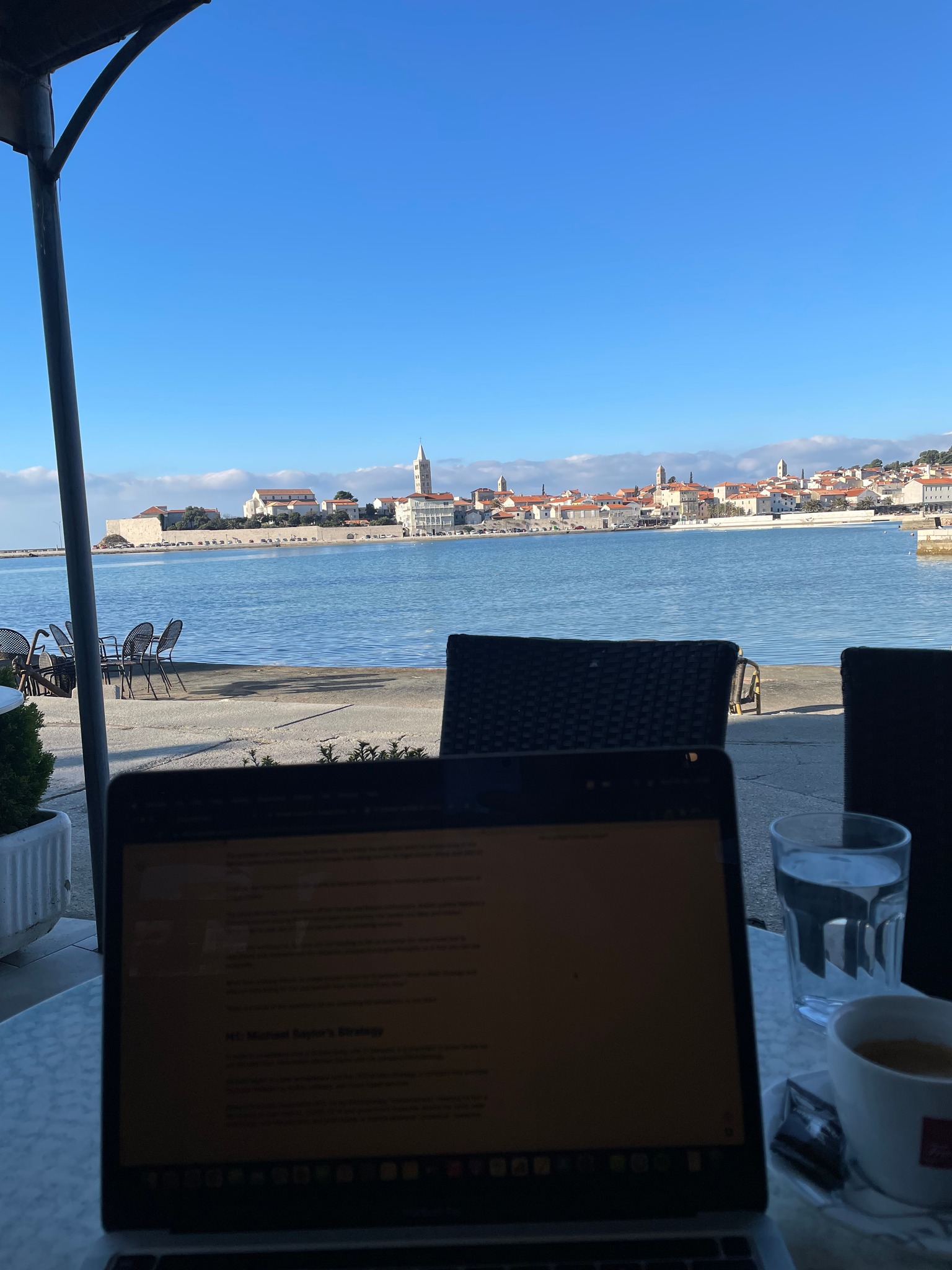
2. Looking for jobs based in Croatia can be a challenging task. How challenging was it for you to get where you are today - it must have taken a lot of determination and rejection.
I was mentally prepared as I knew it would be hard work to find something that suited me well. I must have sent at least 100 proposals, with just a few interviews and responses. There were times when you got a bit down due to no results. I would hit the gym and go to the beach to relax. My friend was in a job search as well, so we encouraged each other.
Determination paid off substantially. In my first "entrepreneur year", I managed to work with two of my business role models. I work with Sovereign Research (ex-Sovereign Man) and the bitcoin economist Saifedean Ammous. I read their books, articles, analyses and lectures during my Uni years, so I was thrilled to work and learn from them.
3. If you can do it, presumably others can too. Are you aware of others who have had similar success, but maybe in different industries?
Yup, for sure. I studied and lived with a couple who had a similar life projector. Actually, in 2022 I spent 6 months living and traveling in Spain with two Croats from Split who work remotely. They are in engineering and marketing. When you think about it, a lot of work these days is done via a computer. Even some parts of medicine. If you can work on a computer in an office, then you can just as easily work from anywhere you want.
Now, I don't want to be that guy who says "Remote work is everything, everyone needs to do it." No...Remote work does have its pros and cons, so it's only for some at certain times, but I would definitely recommend people think about it. It might be just the right thing for them.

4. What is the general feeling among people in Croatia today. Is it possible to have a good life here, or is the grass greener on the other side?
It seems to me that Croatians are divided into two opposite categories: those who want to leave as soon as possible and those who don't even want to think about leaving. Between these two "extremes," I prefer the latter. To quote the British writer Chesterton: "Men did not love Rome because she was great. She was great because they had loved her."Any place can become a "new Rome" if people put their unconditional love and focus into it. The good Lord created an abundant world, and we have to have an abundance mindset. Opportunities are everywhere.
Now, I don't want to moralize others that they shouldn't leave at all. People have their circumstances. Some people don't have a choice at a particular moment in their life. Everyone's life situation is specific. What I want to point out is that these two extremes aren't the only options. You can go abroad and still come back. You can explore the world if you want, but please remember where your home is. So it's not really "either to move away or stay home." You can have both. I still plan to travel internationally. I just began, but I know where to focus my determination.
I will create a "new Rome" out of my little Island of Rab. And I am not alone in this. I have friends, and I know people who are professionals in business and IT who share the same goal. Even though they might not express their goal the same as I did, we all have the same vision of a new Rome. The vision is beautiful, but it will require a lot of work from us. And a little help from the above.
5. Apart from corruption and nepotism, low wages are often cited as a reason to emigrate. But with the remote work revolution, as your example has shown, as well as the influx of many foreign workers to the likes of Rimac and Infobip for example, show that a good quality of life IS possible in Croatia. What are your thoughts on that?
Remote work is a gift from the above for Croatia. Before, you had to leave Croatia to have an opportunity to be in the "big league" with the top players. Now you don't have to. You can work from home and be on the same playing field as people in big cities or more developed countries. This is even more emphasized in smaller places like my Island of Rab. You don't have to move to Zagreb to find a good-paying job or clients. And you don't have to limit yourself to the tourism sector if you don't want to move from home. You can have all the benefits: be home AND work where you want. It's great!
6. What advice do you have for others who would like to stay in Croatia, but have no idea where or how to find a possible remote work job or business as you have managed to do?
Remember that it can take some effort to find what will suit you. And then start applying. As I mentioned, I have sent at least 100 proposals in my first two months of searching, with just a few responses and fewer interviews. But it paid off. Big time. Think about companies you like and visit their "Careers" site. Send your CV and motivation letter even if there isn't an active job opening. None of my clients actively searched for help when I contacted them. Use also LinkedIn. There are many job listings there. It's easy to apply through the platform, but consider that companies will receive MANY job applications. It's better to directly contact companies that you like and try to get some response.
And just be persistent...
7. Three reasons you decided to stay in Croatia, and the one thing you would like to change in this country.
The first reason is family. This is the place where my parents are, grandparents and cousins. It's a healthy thing to raise your own family surrounded by elders and relatives.
Secondly, it's my home. You shouldn't need a reason to love something. You love it unconditionally. Therefore, I do love my island without reason. It's the irrational people that improve things. So my duty (our duty) is to improve the place where we belong.
Thirdly, Croatia is still a majorly Christian country with Christian values. I was not too fond of the secular value system pushed in the more "western" countries. It's a life not lived according to our creation. It's a distorted life with wrong priorities. Croatia is still relatively healthy, so if I want to raise a healthy family, this is THE place to be.
Regarding change, I would like to have more competitive tax structures. Croatia has the "paušalni obrt" structure up to €40,000, which is solid, but I think this can be better. My job is to research global immigration and tax structures, so to give you an example, the Republic of Georgia has a tax structure of 1% tax on income up to $164,000 (around €155,000). Many foreigners in recent years have flocked to Georgia to benefit from this structure. The Croatian digital nomad visa was a success. I believe that a rise of "paušalni obrt" tax structure max cap would benefit Croatia even greater. We have everything digital entrepreneurs need PLUS our location, climate and pleasant culture.
You can check my website at www.antesic.com and my LinkedIn profile if you want to hear more from me.
****
Thanks Dorian, very inspiring, and congratulations on all your success.
You can follow the rest of this series in the dedicated TCN section here.
If you would like to contribute your story to this series, please contact This email address is being protected from spambots. You need JavaScript enabled to view it. Subject Remote Croatia.
****
What is it like to live in Croatia? An expat for 20 years, you can follow my series, 20 Ways Croatia Changed Me in 20 Years, starting at the beginning - Business and Dalmatia.
Follow Paul Bradbury on LinkedIn.
Subscribe to the Paul Bradbury Croatia & Balkan Expert YouTube channel.
Croatia, a Survival Kit for Foreigners is now available on Amazon in paperback and on Kindle.

Croats Living in Croatia, Earning Abroad: Martina Lucic from Svirce, Hvar
December 22, 2022 - The Croatian dream - to live in Croatia and get income from abroad. Meet the locals who are living that dream, and find out how you could, too, in a new TCN series. In the second in the series, meet Matina Lucic, who is enjoying life on her laptop in the Hvar wine village of Svirce.
Croatia, great for a 2-week holiday, but a nightmare for full-time living unless you are very rich, so the perceived wisdom goes. The Croatian dream is to live in Croatia with a nice income from abroad, as many foreigners and remote workers do. For Croatians, if I read the comments in my recent video, Croatia is the Best Place to Live: 8 Reasons Why (see below), salaries are too low and people are forced to emigrate in search of a better life.
While there is definitely an element of truth to this, it got me thinking. The era of remote work is here, and the workplace is increasingly global, with a labour shortage for many skills. It doesn't matter if you are from Boston or Bangladesh if you have the skills, desire, and work ethic, and are able to work remotely online. And while it is certainly true that salaries in Croatia are low, what about the opportunities that the global online marketplace offers? If foreigners can find ways to live in Paradise and work remotely, why not locals? Curious, I posted this on my Facebook and LinkedIn yesterday:
Do I know many Croats who are living in Croatia, but working remotely for international companies who would be interested in being part of a TCN interview series showcasing living in Croatia but earning online, including advice to others on how to get started? It could be an interesting series. If interested, contact me on This email address is being protected from spambots. You need JavaScript enabled to view it. Subject Remote Croatia.
Some 15 emails - and several inspiring stories - later, and I think we have the makings of what could be a rather interesting series, Croats Living in Croatia & Earning Abroad. Next up in the series, Martina Lucic in the village of Svirce on the island of Hvar.
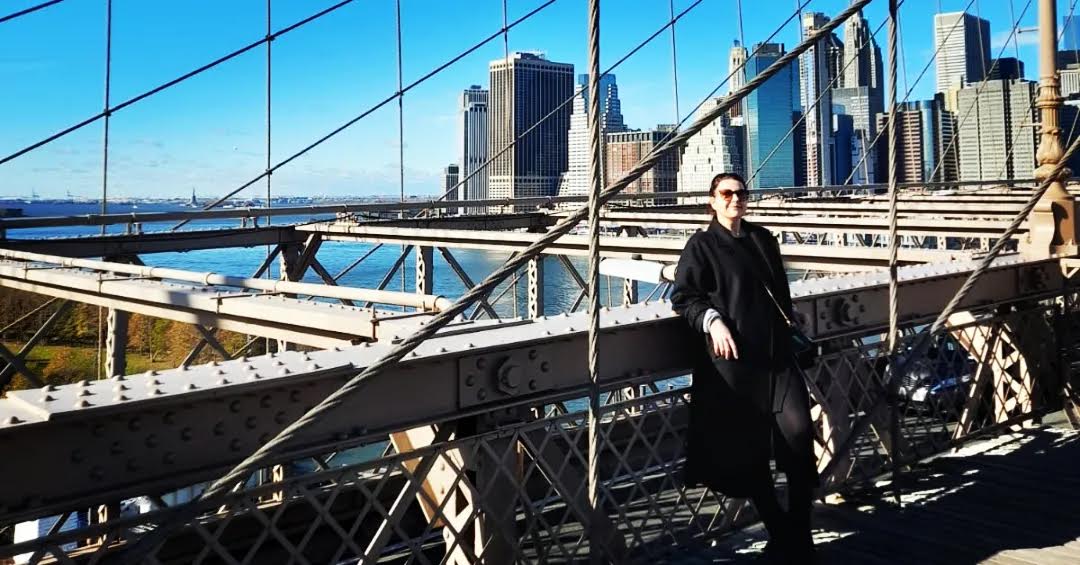
My name is Martina and I come from a small village called Svirče, located on Hvar island. I left Svirče when I was 18 and went to Zadar where I spent almost 9 years. I got my M.A. in French and German Language and Literature at the University of Zadar in 2012. In the meantime, I started my PhD in Humanities at the same university and I am in my final year. In May 2015 I got a job at Amazon in Bratislava, Slovakia where I stayed until March 2022. After getting hired at a UK company called Brainlabs as a PPC Consultant (Digital Marketing) and getting a remote contract, I came back and now I am one happy remote employee.
Many Croats are emigrating but you not only chose to stay, but managed to achieve the Croatian dream - living here and working for an international company. Tell us how you did it.
It was inevitable as I could not find permanent employment in Croatia after I finished my M.A. studies. I speak a couple of languages and I could find a job in tourism, but I wanted a steady salary and a normal work-life balance. I have a huge experience in tourism as I started working in the summers when I was 15 but I could not imagine doing that my whole life. Customer service at Amazon was horrible but I was doing some extra activities like training new hires so I got to do some travelling - I spent a week in Regensburg, a week in Berlin, three weeks in Bangalore, India, and I had so much fun as a trainer. After my department got shut down in Bratislava, I got a position at Amazon Ads. I did not know anything about it but I spoke German fluently. So my ex-boss hired me, taught me everything and I realised that I loved that job. But I was not happy in Slovakia and I felt like it was time to go home. I missed my family, pets, island, sea, and climate so when I got an offer from Brainlabs, I accepted it. They contacted me through LinkedIn. My main condition was a remote contract and they allowed it so here I am.
Looking for jobs upon graduation can be a challenging task. How challenging was it for you to get where you are today - it must have taken a lot of determination and rejection.
Oh yes - I remember sending tons of emails with my CV attached and asking for a chance to prove myself and then getting no response. It was really hard as you need to pay for the flat, utilities, food. I could only dream about buying new clothes, make-up, travelling. As I said, leaving Croatia was inevitable for me.
If you can do it, presumably others can too. Are you aware of others who have had similar success, but maybe in different industries?
Of course - I have met many people while living abroad. Some of them came back and started families, some went to other countries and are not planning to come home before retirement.
Everyone can do it, but one needs to be prepared for a struggle, failing, sacrifices. It is not easy, but it is worth it when you take a look at the bigger picture. Eyes on the prize and keep going.
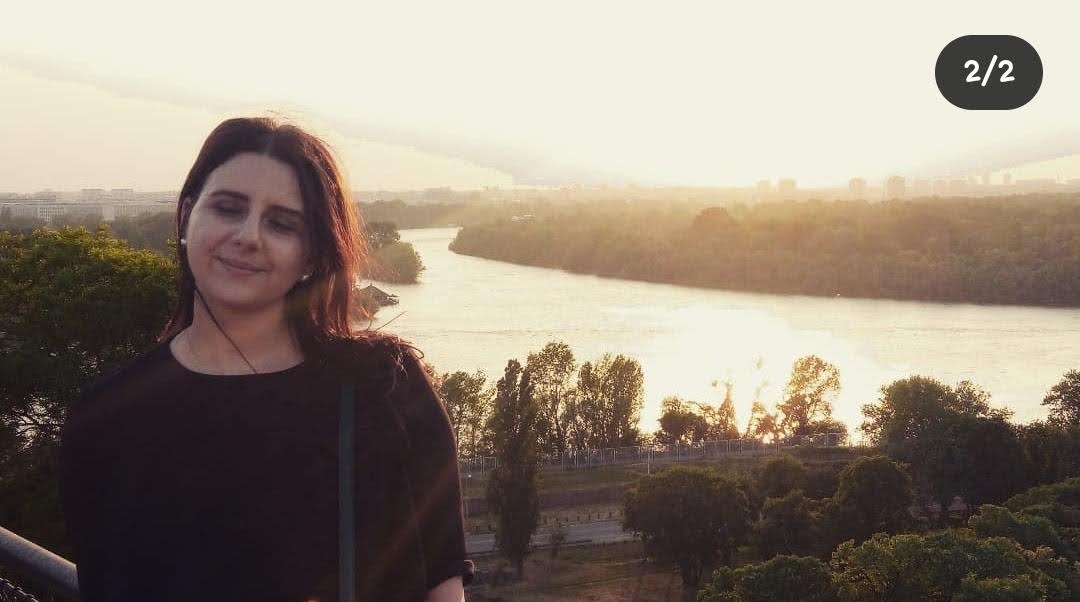
What is the general feeling among young people in Croatia today: Is it possible to have a good life here, or is the grass greener on the other side?
Everything is so expensive nowadays and our salaries are not sufficient so it can be very challenging. This is a beautiful country and it has huge potential but we depend too much on tourism. The grass is not greener on the other side. It is nice to go abroad for a few years, gain some experiences, meet new people, but only if you can learn skills that will help you have a good life here in the future.
Apart from corruption and nepotism, low wages are often cited as a reason to emigrate. But with the remote work revolution, as your example has shown, as well as the influx of many foreign workers to the likes of Rimac and Infobip for example, show that a good quality of life IS possible in Croatia. What are your thoughts on that?
Absolutely. We need to let foreign companies open their offices here, government could perhaps reduce taxes for them and let them hire our people. I do not think that any young person would leave Croatia if they would have the possibility to grow professionally and earn a salary for a decent life here.
What advice do you have for others who would like to stay in Croatia, but have no idea where or how to find a possible remote work job or business as you have managed to do?
Never stop learning and gaining new skills, grow your LinkedIn network, and have realistic expectations. Once you land a job, work hard to prove your worth and your employer's trust. In the meantime, while waiting for a chance, do not sit on the couch and just wait. That is the worst thing you can do. While waiting for your dream job, you can work in customer service, shops, gas station, etc. You'll always learn something new, earn some money, meet new people, and you never know what that experience can bring you. Croatia has a 15 days notice period so you can always leave but also do not change your job too often.
Three reasons you decided to stay in Croatia, and the one thing you would like to change in this country.
Reasons to stay:
1. My family and my friends;
2. Enjoying mild climate in Dalmatia;
3. Possibility to speak Croatian after work;
One thing to change:
1. Too low wages and lack of possibilities to grow professionally
****
Thanks Martina, very inspiring, and congratulations on all your success.
You can follow the rest of this series in the dedicated TCN section here.
If you would like to contribute your story to this series, please contact This email address is being protected from spambots. You need JavaScript enabled to view it. Subject Remote Croatia.
****
What is it like to live in Croatia? An expat for 20 years, you can follow my series, 20 Ways Croatia Changed Me in 20 Years, starting at the beginning - Business and Dalmatia.
Follow Paul Bradbury on LinkedIn.
Subscribe to the Paul Bradbury Croatia & Balkan Expert YouTube channel.
Croatia, a Survival Kit for Foreigners is now available on Amazon in paperback and on Kindle.

Croats Living in Croatia, Earning Abroad: Tea Jurisic from Baska Voda
December 21, 2022 - The Croatian dream - to live in Croatia and get income from abroad. Meet the locals who are living that dream, and find out how you could, too, in a new TCN series. We start with the inspiring and very determined Tea Jurisic from Baska Voda.
Croatia, great for a 2-week holiday, but a nightmare for full-time living unless you are very rich, so the perceived wisdom goes. The Croatian dream is to live in Croatia with a nice income from abroad, as many foreigners and remote workers do. For Croatians, if I read the comments in my recent video, Croatia is the Best Place to Live: 8 Reasons Why (see below), salaries are too low and people are forced to emigrate in search of a better life.
While there is definitely an element of truth to this, it got me thinking. The era of remote work is here, and the workplace is increasingly global, with a labour shortage for many skills. It doesn't matter if you are from Boston or Bangladesh if you have the skills, desire, and work ethic, and are able to work remotely online. And while it is certainly true that salaries in Croatia are low, what about the opportunities that the global online marketplace offers? If foreigners can find ways to live in Paradise and work remotely, why not locals? Curious, I posted this on my Facebook and LinkedIn yesterday:
Do I know many Croats who are living in Croatia, but working remotely for international companies who would be interested in being part of a TCN interview series showcasing living in Croatia but earning online, including advice to others on how to get started? It could be an interesting series. If interested, contact me on This email address is being protected from spambots. You need JavaScript enabled to view it. Subject Remote Croatia.
Some 15 emails - and several inspiring stories - later, and I think we have the makings of what could be a rather interesting series, Croats Living in Croatia & Earning Abroad. We start with a very determined young lady called Tea. Who would have predicted this for an artist graduating from a Croatian university in search of a job? Lesson learned - if you really want it, it is out there.
(Studio at Cite Internationale des Arts in Paris)
My name is Tea Jurišić, and I am an illustrator and muralist from Baška Voda, running a one-woman studio called KVAR Illustration. The first child of five, born in January, from an early age, I have had the urge to see what was happening around the corner. In that manner, I finished the High School of Fine Arts in Split and the Academy of Fine Arts in Zagreb, and continued with my nomadic lifestyle working in Osijek. Before I started my professional artistic career, I worked as a diving instructor for 8 years on the beautiful Croatian coast. When I became a freelancer, I realized everything is possible, so I traveled a lot, and even experienced travelling and living in a campervan with my boyfriend for two years in a row, driving through Greece, Albania, Montenegro, and Croatia. This lifestyle taught me more than all the years of formal education; I learned about different cultures, people, and nature.
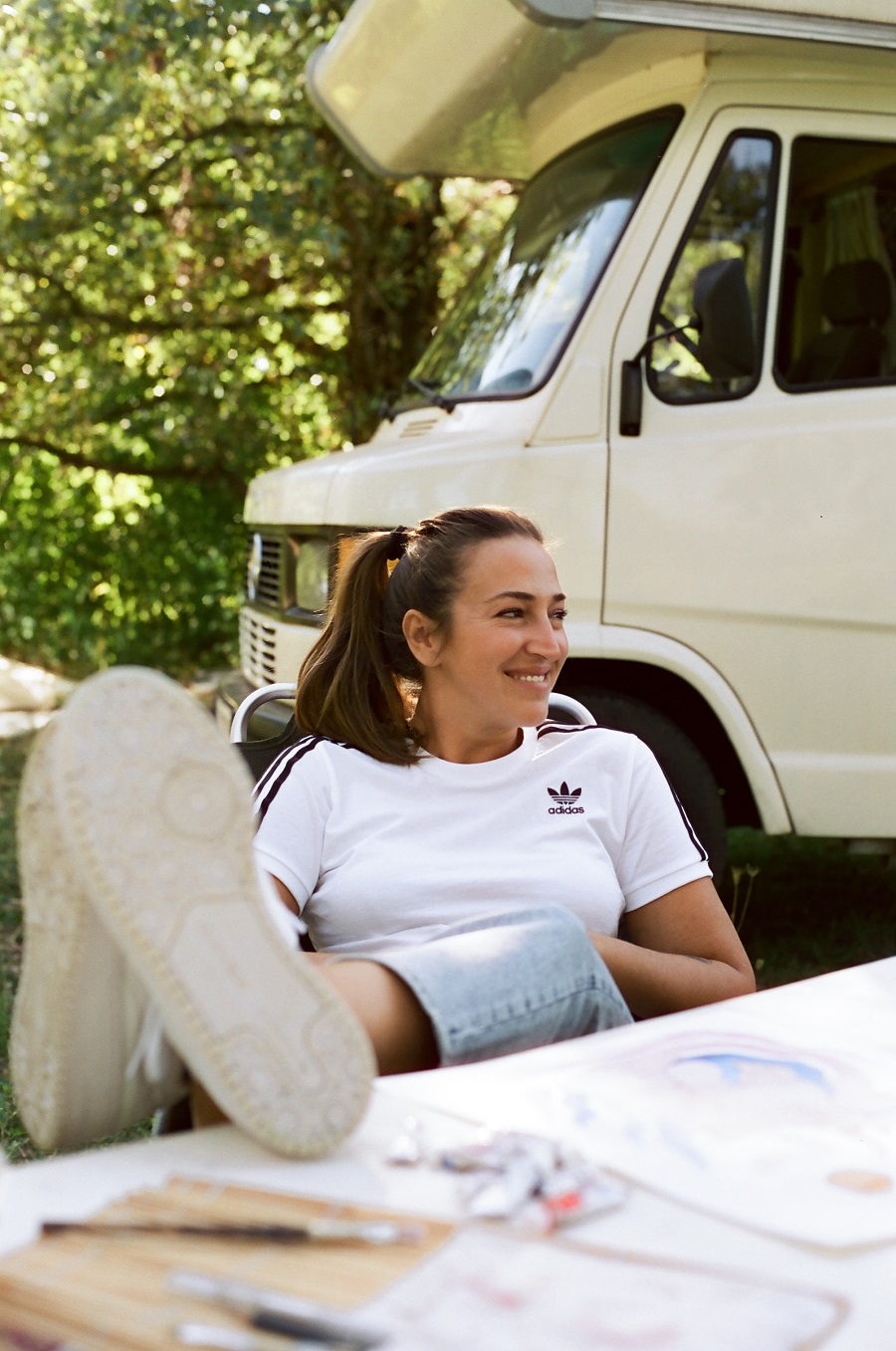
(Campaign for Adidas - 404 Agency)
For an artist, this is an unforgettable experience providing a great amount of inspiration. Last year around this time I spent 3 months at an artist residency at Cite Internationale des Arts in Paris, and at the moment, I am working and enjoying the Hafenkombinat residency in Leipzig. Some of my clients include: Adidas, L'Oreal, Samsung, Beck's brewery, LELO, Wienerinsurance, Adris Group, Ozujsko, and many more.
Looking for jobs upon graduation can be a challenging task. How challenging was it for you to get where you are today - it must have taken a lot of determination and rejection.
During my study, I worked a summer job as a scuba diving instructor in our family diving center on the coast. It was a great job, but I experienced it more as a job, and less as my passion. In the wintertime, I was an assistant at the Academy of Arts in Osijek. After 2 years of working at the faculty, I realized I was not made to educate other people in an academic manner. I missed freedom, and I struggled with money a lot. At one moment, I realized nobody would come to knock on my door with the request: ”Hello, is there an artist living here, we want to work with you?” I built a portfolio and started to send it to a million e-mail addresses. I accepted any work I got. At first, I experienced a lot of disappointment and unpaid hours, but since I am the first child of five siblings as well as a stubborn Dalmatian, I just decided not to get offended by the situation and rejection.
I started my own business at the worst possible time, in the first months of the lockdown, and I didn't get support from the government. That made me even more determined to succeed, and I tried to represent myself everywhere online, I started to “iskakati iz paštete”, as we say in Croatia (literally, to pop out of the pate, or to be everywhere). Step by step, I got a few good offers from good clients, and the turning point was an offer from one fantastic Swedish company to draw illustrations for them. Since then, the tables have completely turned and people started to reach out to me. I started to work with agencies all around the globe, illustrating and joining street art projects. I am still in charge of illustration projects for my first big, Swedish client, and that is one of my favorite things to do.
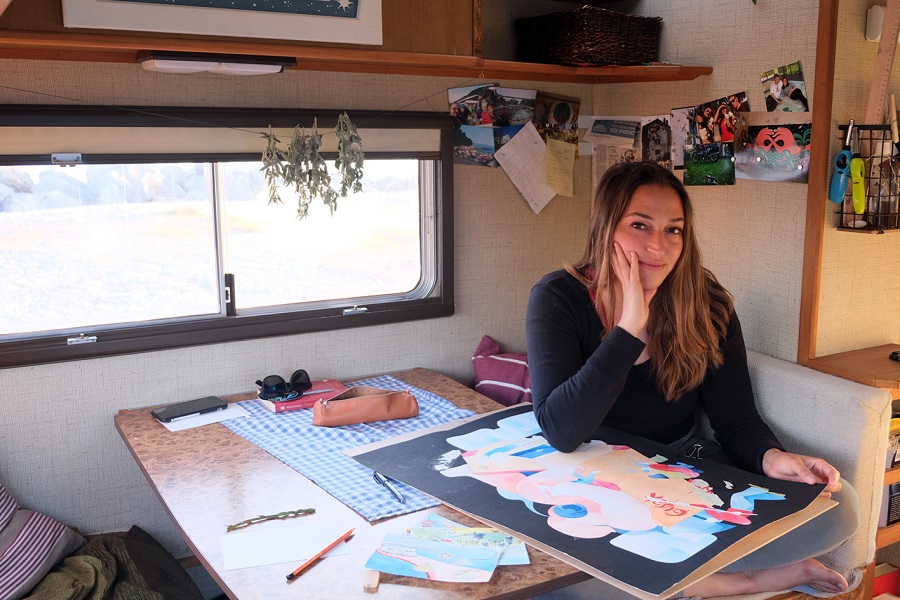
(Tiny studio in the Bercedes benz camper in Greece)
If you can do it, presumably others can too. Are you aware of others who have had similar success, but maybe in different industries?
Of course, but in the Croatian media, you will not hear about them because positive news is not interesting news.You will read about gossip, drama and lying politicians, and watch funny videos of cats and dogs. I think people are trying to escape from everyday problems by soaking in this kind of news, which makes them a little bit passive.
On the other hand, there is a constantly growing sector of many different industries with self-employed people in Croatia, especially IT, marketing, and graphic design...Even in artistic fields, my colleagues started to open businesses and invest time in education about marketing and project writing. This is not something that they are teaching you at the Academy, and that is the biggest flaw of that faculty.
People graduate, and then they are on their own, without mentors and without knowing how to represent and sell their work. However, I have seen positive growth in the last few years. People have had enough, they want to be their own bosses rather than working for companies that would pay them peanuts.

(A recent collaboration with BITE ART & Design Studio Izvorka Juric - Photos DB Izvorka Juric)
What is the general feeling among young people in Croatia today: Is it possible to have a good life here, or is the grass greener on the other side?
Croatian people are sometimes suffering from low self-esteem, which doesn't surprise me since there is a general opinion that they should grab any work offered and that they should be happy only because they have the opportunity to work. Even if that means they are totally unhappy. I think Croatia is one of the best countries in Europe to live in if you have the opportunity to work remotely. I believe Croatia has one of the best business systems in the form of “paušalni obrt.” in that case, tax is very low, and the monthly fee you pay for retirement, health, etc. is negligible in comparison to what you can earn up to 300 000 kunas (40 000 €) annually. I am saying this because people are focused on negativity, and they sometimes simply don't know all the possibilities available. Only 30 years ago, artists had to go from door to door with their portfolios. The Internet is the best thing ever if you use it properly. Do the research, and connect with people; today you can make it from your sofa. How amazing is that?
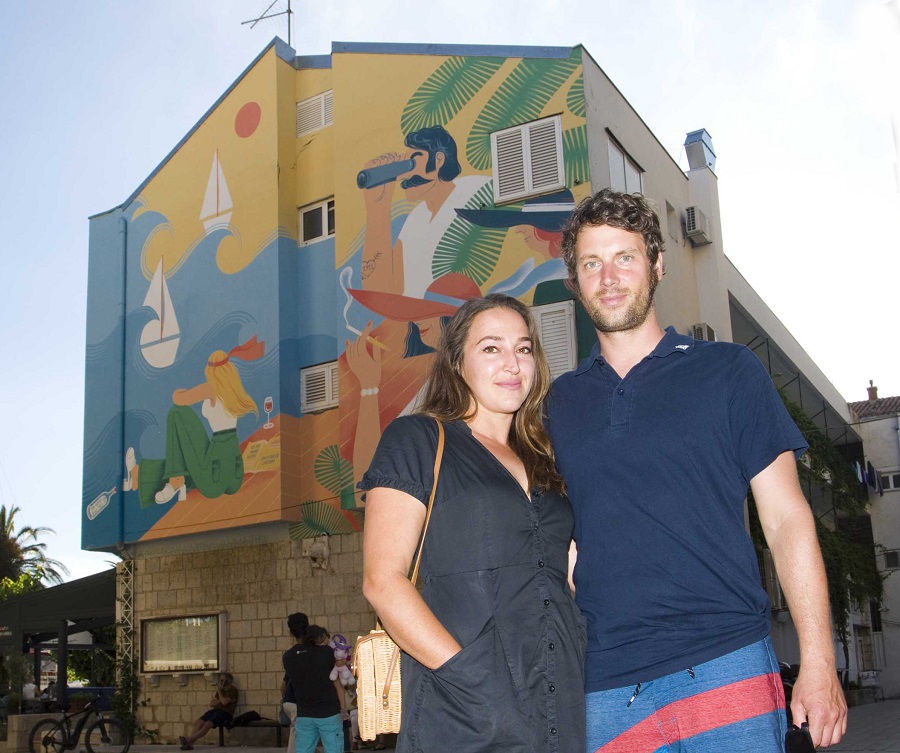
(Mural in Makarska, with boyfriend Ludwig, who assisted on the project - Photo Makarska Kronika)
Apart from corruption and nepotism, low wages are often cited as a reason to emigrate. But with the remote work revolution, as your example has shown, as well as the influx of many foreign workers to the likes of Rimac and Infobip for example, show that a good quality of life IS possible in Croatia. What are your thoughts on that?
My opinion is that Infobip and Rimac are wonderful things that happened to this country. We can learn directly from Rimac's example – a young person who dares to take risks, who has a perfect work ethic, and who cares about his employees because he realizes how important they are. They are a team. Remote work is the future for people who like to explore other business opportunities, apart from mass tourism or being in the HDZ party.
People always think the grass is greener on the other side and that they can earn more money in Germany or Ireland. Although that may be true, in many cases, you will not have a life. I do not see myself spending the best years of my life working from 8 – 17, coming home, and not having the energy for anything else. For me, everything in life should have a good balance – work, enjoyment, and love.
Hedonism is good, and they are teaching us that laziness is a sin. It's not if there is the right amount of it, and in many cases, “laziness” can lead you to the greatest creative solutions. One big part of my work is lying down, sitting, and resting, which for me is a synonym for thinking, because the most important part of my work is the IDEA, the idea how to create an illustration, how to paint, and how to represent the motifs metaphorically. I cannot get these ideas without resting, thinking, and looking like a lazy sloth to other people. That is, however, possible with remote work!

What advice do you have for others who would like to stay in Croatia, but have no idea where or how to find a possible remote work job or business as you have managed to do?
Be ready to invest a lot of time online in research and attempt to connect with people from similar branches. Learn from them. Watch tutorials on how to make an eye-catching LinkedIn profile, and how to present yourself in the best way possible. Confidence is the key. Even if you are not confident at the moment, act like you are, and soon you will become confident. Show a little bit of nerve at the right moment, you will for sure trigger reactions. Think about your unique selling points and how to show them in the best way possible. There are numerous job platforms online, check which one would fit your needs, and the moment you are satisfied with your CV and presentation, start contacting the companies you are interested in. Details are very important, learn how to write a proper e-mail which will encourage potential clients to read it.
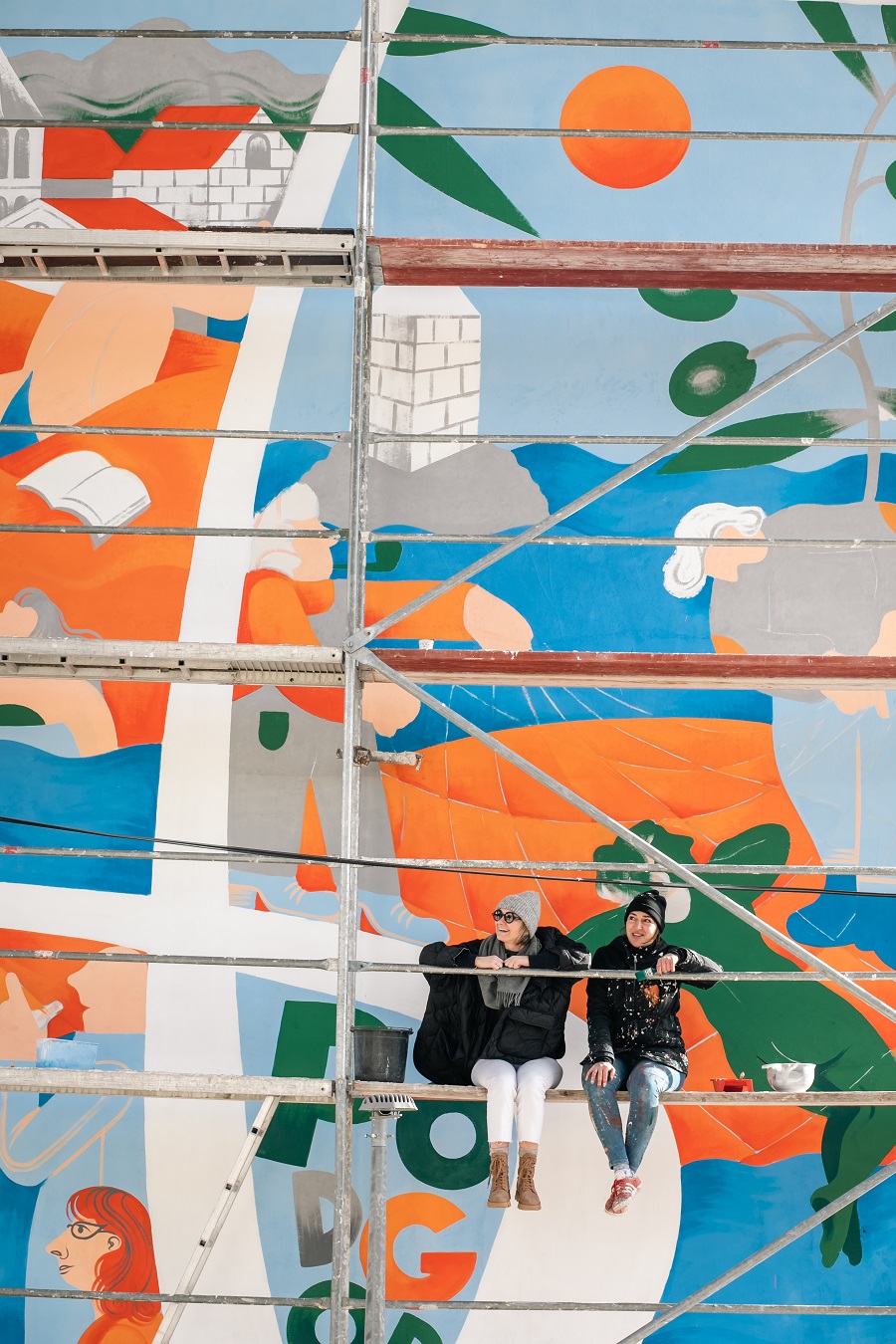
(Mural in Podgora - Photo Dario Odak)
Three reasons you decided to stay in Croatia, and the one thing you would like to change in this country.
1. Breathtaking nature, I come from the Makarska Riviera, which is the most beautiful part of the coast (sorry Istria):)
2. The lifestyle in Dalmatia. When I think of lifestyle, I do not think of having 20 apartments and doing nothing, I think about being a part of hedonism culture, slow, quality living, soaking in the beautiful sun, appreciating nature and the healing sea. Sometimes we do not stop to appreciate the heaven we live in.
3. Ćevapi
I would like to change the general mood of not forgiving other people's success in Croatia. That is one nasty, childish habit among the people here. A lot of them simply don't understand that other, positive business examples can lead to their own growth and new experiences. Successful people are not your enemies but an opportunity to be inspired to make something of your own.
****
Thanks Tea, very inspiring, and congratulations on all your success. You can connect to Tea via her LinkedIn, Instagram, and website.
www.linkedin.com/in/teajurisic/ www.behance.net/kvar www.instagram.com/tea_jurisic/
If you would like to contribute your story to this series, please contact This email address is being protected from spambots. You need JavaScript enabled to view it. Subject Remote Croatia.
****
What is it like to live in Croatia? An expat for 20 years, you can follow my series, 20 Ways Croatia Changed Me in 20 Years, starting at the beginning - Business and Dalmatia.
Follow Paul Bradbury on LinkedIn.
Subscribe to the Paul Bradbury Croatia & Balkan Expert YouTube channel.
Croatia, a Survival Kit for Foreigners is now available on Amazon in paperback and on Kindle.



